#he parallels aziraphale perfectly
Explore tagged Tumblr posts
Text
God loves you, but not enough to save you.
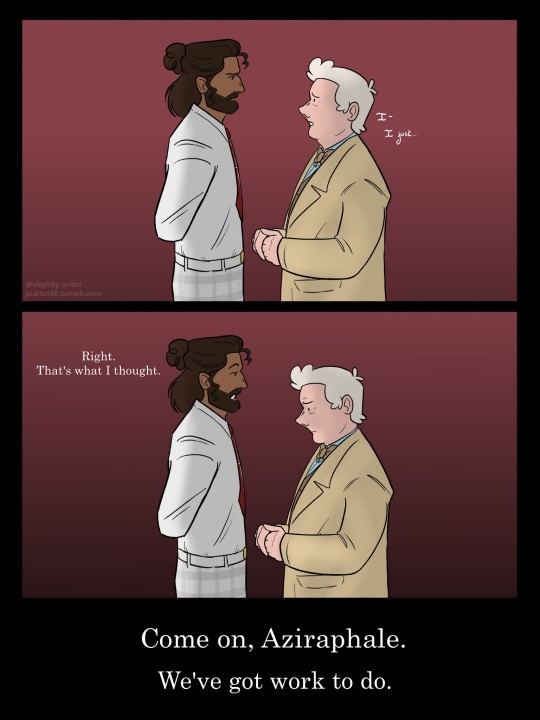
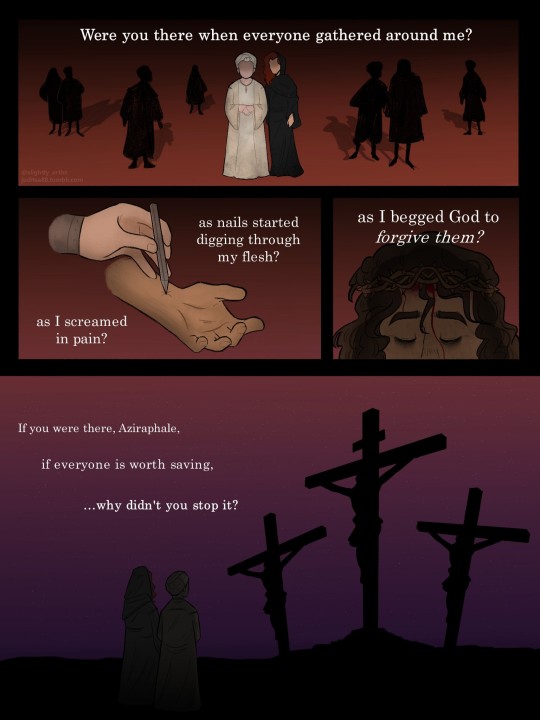
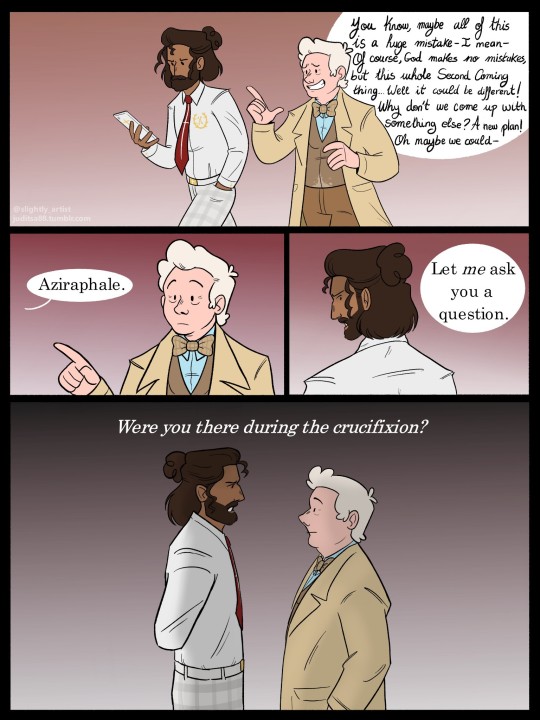
Based on this scenario!
#juddrawing#as i said i have big emotions and thoughts about jesus in the context of good omens and i think he can be such an interesting character#he parallels aziraphale perfectly#a character that needs to discover free will and that he is more than God's pawn#i need a confrontation to happen too...#good omens#crowley#ineffable husbands#aziraphale#good omens fanart#aziracrow#good omens 2#ceo jesus#comic#good omens 3
661 notes
·
View notes
Text
Putting the Meta in "Metatron"
(couldn't resist the pun, sorry)
Ok, this has been tickling my brain for a while. I've been thinking about how The Metatron designed his role and discourse specifically to manipulate Aziraphale into the end result we saw in the last minutes of S2. I become obsessed with it because… well, I'm a bit obsessive, but also because there were many really smart writing decisions that I loved (even when I despise The Metatron exactly for the same reasons. Hate the character, love the writer). If you haven't watched Good Omens Season 2, this is the moment to stop reading. Come back later!
We already know that in Book Omens, the role of Gabriel in the ending was occupied by The Metatron. Of course, the series introduced us to Gabriel and we won a lot by that, but I feel that the origins of The Metatron should be considered for any of this. He is not a "sweet old man": he was the one in charge of seeing over the operation of Armageddon; not just a stickler of rules, but the main promoter for it.
However, when he appears in the series finale, we first are primed to almost pass him by. He is in the line for buying coffee, using clothes that are:
obviously not tailored (almost ill fitted)
in dark tones
looking worn and wrinkled
This seems so important to me! All the angels we have seen are so proud of their aspect, wear clear (white or off white) clothes, pressed, impeccable (even Muriel), even when they visit the Earth (which we have already seen on S1 with all the visits to the bookshop). The Metatron chose a worn, comfortable attire, instead. This is a humanized look, something that fools all the angels but which would warm up someone very specific, can you guess?
After making quite a complicated coffee order (with sort of an affable and nervous energy), he makes a question that Crowley had already primed for us when asking Nina about the name of the coffee: having a "predictable" alternative and an unpredictable one.
This creates an interesting parallel with the next scene: Michael is discussing the possibility of erasing Aziraphale from The Book of Life (a punishment even worse than Holy Water on demons, because not having existed at all, EVER is definitely worse than having existed and ceased to exist at some point) when The Metatron arrives, interrupts the moment and signals having brought coffee. Yup, an amicable gesture, but also a "not death" offering that he shows clearly to everyone (even when Michael or Uriel do not understand or care for it. It wasn't meant for them). He even dismisses what Michael was saying as "utter balderdash" and a "complete piffle", which are the kind of outdated terms we have heard Aziraphale use commonly. So, The Metatron has put up this show for a specific audience of one.
The next moment on the script has Metatron asking Crowley for the clarification of his identity. Up to this moment, every angel has been ignoring the sprawled demon in the corner while discussing how to punish Aziraphale… But The Metatron defers to the most unlikely person in the room, and the only one who will push any buttons on Aziraphale: Crowley. After that, Aziraphale can recognize him, and Metatron dismisses the "bad angels" (using Aziraphale's S1 epithet) with another "catchy old phrase", "spit spot", while keeping Muriel at the back and implying that there is a possibility to "check after" if those "bad angels" have done anything wrong.
Up to this moment, he has played it perfectly. The only moment when he loses it is when he calls Muriel "the dim one", which she ignores… probably because that's the usual way they get talked to in Heaven. I'm not sure if Aziraphale or Crowley cared for that small interaction, but it is there for us (the audience) to notice it: the sympathy the character might elicit is built and sought, but he is not that nice.
After that, comes "the chinwag" and the offer of the coffee: the unnecessarily complicated order. It is not Aziraphale's cup of tea (literally), but it is so specific that it creates some semblance of being thought with care, and has a "hefty jigger" of syrup (again with the funny old words). And, as Aziraphale recognizes, it is "very nice!" (as The Metatron "jolly hoped so"), and The Metatron approves of him drinking it by admitting he has "ingested things in my time, you know?". This interaction is absolutely designed to build a bridge of understanding. The Metatron probably knew that the first response he would get was a "no", so he tailored his connection specifically to "mirror" Aziraphale: love of tasty human treats he has also consumed, funny old words like the ones he loves, a very human, worn, well-loved look. That was the bait for "the stroll": the moment when Aziraphale and Crowley get separated, because The Metatron knew that being close to Crowley, Aziraphale would have an hypervigilant soundboard to check the sense of what he was going to get offered. That's what the nasty look The Metatron gives to Crowley while leaving the bookshop builds (and it gets pinpointed by the music, if you were about to miss it).
The next thing we listen from The Metatron is "You don't have to answer immediately, take all the time you need" in such a friendly manner… we can see Aziraphale doubting a little, and then comes the suggestion: "go and tell your friend the good news!". This sounds like encouragement, but is "the reel". He already knows how Crowley would react, and is expecting it (we can infer it by his final reaction after going back for Aziraphale after the break up, but let's not get ahead of ourselves shall we?). He even can work up Muriel to take care of the bookshop while waiting for the catch.
What did he planted in Aziraphale's mind? Well, let's listen to the story he has to tell:
"I don't think he's as bad a fellow… I might have misjudged him!" — not strange in Aziraphale to have such a generous spirit while judging people. He's in a… partnership? relationship? somethingship? with a demon! So maybe first impressions aren't that reliable anyway. The Metatron made an excellent job with this, too.
"Michael was not the obvious candidate, it was me!" — This idea is interesting. Michael has been the stickler, the rule follower, even the snitch. They have been rewarded and recognized by that. Putting Aziraphale before Michael in the line of succession is a way of recognizing not only him, but his system of values, which has always been at odds with the main archangels (even when it was never an open fight).
"Leader, honest, don't tell people what they want to hear" — All these are generic compliments. The Metatron hasn't been that aware of Aziraphale, but are in line with what would have been said of any "rebel leader". They come into context with the next phrase.
"That's why Gabriel came to you, I imagine…" — I'm pretty sure The Metatron didn't imagine this, ha. He is probably imagining that the "institutional problem" is coalescing behind his back, and trying to keep friends close, but enemies closer… while dividing and conquering. If Gabriel rebelled, and then went searching for Aziraphale (and Crowley, they are and item and he knows it), that might mean a true risk for his status quo and future plans.
Heaven has great plans and important projects for you — this is to sweeten the pot: the hefty jigger of almond syrup. You will be able to make changes! You can make a difference from the inside! Working for an old man who feels strangely familiar! And who recognizes your point of view! That sounds like the best job offer of the world, really.
Those, however, are not the main messages (they are still building good will with Aziraphale); they are thought out to build the last, and more important one:
Heaven is well aware of your "de facto partnership" with Crowley…
It would be considered irregular if you wanted to work with him again…
You, and you alone, can bring him to Heaven and restore his full angelic status, so you could keep working together (in very important projects).
Here is the catch. He brought the coffee so he could "offer him coffee", but the implications are quite clear: if you want to continue having a partnership with Crowley, you two must come to Heaven. Anything else would be considered irregular, put them in a worst risk, and maybe, just maybe, make them "institutional enemies". Heaven is more efficient chasing enemies, and they have The Book of Life as a menace.
We already know how scared Aziraphale has always been about upsetting Heaven, but he has learned to "disconnect" from it through the usual "they don't notice". The Metatron came to tell him "I did notice, and it has come back to bite you". The implied counterpart to the offer is "you can always get death". Or even worse, nonexistence (we have already imagined the angst of having one of them condemned to that fate, haven't we?)
When The Metatron arrives, just after seeing Crowley leave the bookshop, distraught, he casually asks "How did he take it?", but he already knows. That was his plan all along: making them break up with an offer Aziraphale could not refuse, but Crowley could not accept. That's why he even takes the license to slightly badmouth Crowley: "Always did want to go his own way, always asking damn fool questions, too". He also arrive with the solution to the only objection Aziraphale would have: Muriel, the happy innocent angel that he received with so much warmth and kindness, is given the opportunity to stay on Earth, taking care of the bookshop. The only thing he would have liked to take with him is not a thing, and has become impossible.
If God is playing poker in a dark room and always smiling, The Metatron is playing chess, and he is quite good at it (that's why he loves everything to be predictable). He is menacing our pieces, and broke our hearts in the process… But I'm pretty sure he is underestimating his opponents. His awful remark of Muriel being "dim"; saying that Crowley "asks damn fool questions", and even believing that Aziraphale is just a softie that can be played like a pipe… That's why telling him the project is "The Second Coming" was an absolute gift for us as an audience, and it prefigures the downfall that is coming — the one Aziraphale, now with nothing to lose, started cooking in his head during that elevator ride (those couple of minutes that Michael Sheen gifted to all of us: the shock, the pain, the fury, and that grin in the end, with the eyes in a completely different emotion). Remember that Aziraphale is intelligent, but also fierce. Guildernstern commited a similar mistake in Hamlet, and it didn't go well:
"Why, look you now, how unworthy a thing you make of me! You would play upon me, you would seem to know my stops, you would pluck out the heart of my mystery, you would sound me from my lowest note to the top of my compass, and there is much music, excellent voice, in this little organ, yet cannot you make it speak. 'Sblood, do you think I am easier to be played on than a pipe? Call me what instrument you will, though you can fret me, you cannot play upon me."
I'm so excited to learn how this is going to unfold!! Because our heroes have always been very enthusiastic at creating plans together, failed miserably at executing them, and even then succeeding… But now they are apart, more frustrated and the stakes are even higher. Excellent scenario for a third act!
*exits, pursued by a bear*
#good omens#good omens 2#good omens meta#good omens spoilers#aziraphale#ineffable spouses#ineffable divorce#narrative analysis#character analysis#the metatron#and a casual Hamlet quote#just because I love Hamlet
2K notes
·
View notes
Text
i feel like all my meta posts just clicked and solved a puzzle in my brain. however i am also currently upping my sleep med dosage so if any of this sounds like the incoherent rambles of a mad man it's cause i am. incoherent and insane and rambling that is. (not a man)
but i have to write this post since i had a lightbulb realization moment.
because the thing is, besties, that aziraphale is a fucking horrible liar. he gets nervous and fidgety, he stutters, you can SEE him sweating anxiety. just look at him in the bookshop when the archangels inquire about their not-so-little 25 lazarii miracle.
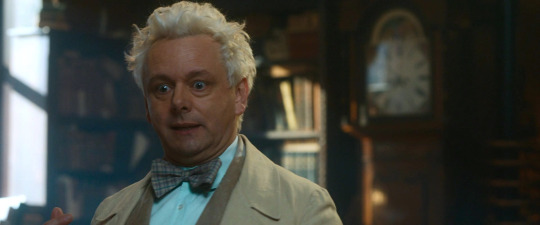
his best "lies" are when he is actually telling the truth but twisted. he has never been a good liar (see job) and that has not changed in six thousand years. all smiles directed at archangels are visibly wrong, his discomfort is tangible.
whenever he panics it is written across his face clear as day, including, and this is the important bit, when he is talking to the metatron.

now, you are wondering why exactly that matters, and the point is something we have all talked and thought about for ages but my brain just. formed some new neural pathways.
because he is a terrible liar, he is horrible at hiding his emotions.
but you know who isn't?
crowley.
unless you know him, it is very hard to read his facial expressions with his glasses on. he can turn his emotions "off", he can put a wall in front of them and by extension around himself.
i talked about it more in this post, so for background info have a look at it (if you want to)
it's crowley's thing yet there is one moment, one, glorious moment in which aziraphale executes it perfectly. and that moment mirrors crowley putting on his glasses, it is aziraphale attempting to hide away all of his feelings and thoughts so no one can tell what he is really thinking.
the parallels besties. the fucking parallels.
what really sells it to me is that last comparison because it matches too well to not be intentional. honestly, after the sink story i think every little thing in this show is done on purpose and with attention to detail, so.
the empty look, the heartbreak, the pain - the realization. this is it. i am not walking away from this unharmed but i am walking away. or rather into the loneliness, the absence of the person i love.
for aziraphale also the realization that the world is about the get fucked and he is not.

after that we have the inhale of courage. taking a deep breath to calm yourself, to find your way back to your body. a kind of preparation we have all done at one point or another.

the mask slides into place. or at least you want it to slide into place, you are trying to fucking jam it into the spot you need it to be but sometimes it's like trying to push the square peg through the round hole.
it's a disconnect, it's putting up a physical and emotional wall. crowley does it to hide away from aziraphale.
aziraphale does it hide from heaven and the metatron, yes, but he does it to hide from himself. at his core, aziraphale compartmentalizes. he is so fucking good at cognitive dissonance it's scary, and that's what happens here.

he knows, he KNOWS, that he needs to lock up his feelings or he won't be able to get into that fucking lift and do what he thinks he needs to do.
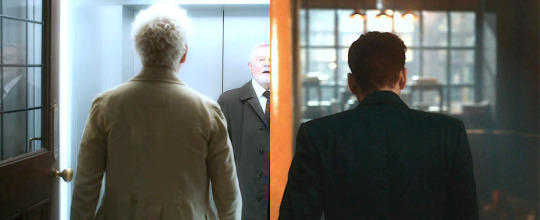
and so he walks away from crowley just like crowley walked away from him, copying him and doing exactly what he has seen him do a thousand times: putting up wall after wall after wall. ripping out every sprout of vulnerability before it can bloom.
except that he stopped doing it after the no-pocalypse, and that is why it hurts so fucking badly when he puts his glasses back on.
he is not ripping out a sprout, he is uprooting an entire fucking tree
aziraphale cannot hide behind sunglasses by crowley so he hides underneath an angelic persona, the person he thinks he should be, needs to be, and the problem is that whenever he slips into that role, it becomes him.
getting crowley to take off his glasses again is going to be a herculean task and the same goes for getting aziraphale to drop his act. they're one and the same in shape and origin and purpose but they are not indestructible.
because listen. all of this is painful and it hurts. it really is.
the fun part, however, is the fact that we know exactly what it takes to destroy that barrier, we have seen it happen to crowley before.
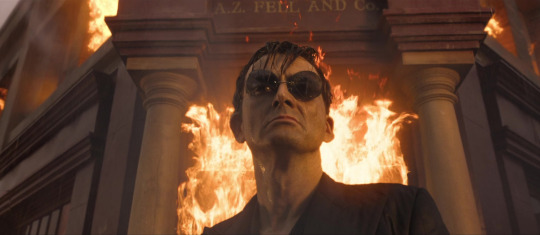
my point is that we are missing the parallel for said destruction.
#alex talks good omens#good omens#ineffable husbands#crowley#aziraphale#good omens season 2#go2#aziracrow#crowley x aziraphale#ineffable divorce#the final fifteen#good omens meta#if there's any spelling or grammar errors pls know i typed half of this with my eyes closed bc my meds are kicking in
668 notes
·
View notes
Text
What the fuck is Jesus up to in Good Omens season 3?
This is a question I've been thinking long and hard these past couple of days and I have some THOUGHTS SO. Buckle up.
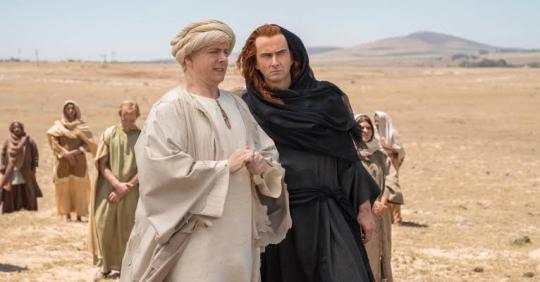
Aziraphale and Crowley watching the Crucifixion (Good Omens, 2019)
First off. The answer to the question posited is relatively simple. What is Jesus up to in GO3? With s2's ending in mind and with the hints we've gotten for 668: Neighbor of the Beast over the years, we know he's descending to Earth to initiate the Second Coming. And that Aziraphale would probably make that happen - or do everything that he can as Supreme Archangel to sabotage it.
But I wanted to examine on how Jesus might fit into Good Omens' overall narratives and established themes - about morality and humanism and free will, and. I'm just saying, there are A LOT of fascinating routes they could do for his character.
(Disclaimer as usual: this is a theory that I obsessed over when I was stuck at the cemetery during All Souls' Day and must be treated as such. In no way am I insisting this should be how canon events must happen. I am just doing this for the funsies.)
The THING about Jesus if you situate him in the world of Good Omens (with the assumption that most of the pop culture Christology mythos associated with him remain intact) is that in this context he very quickly becomes: 1. Adam Young's narrative foil; and 2. an Aziraphale parallel.
Now, the first one is obvious. Of COURSE he is Adam Young's foil, duh. Adam isn't called the ANTICHRIST for nothing. Brought into the world just for the sole purpose of ending it. However, when the time comes for him to fulfill the Will of his Satanic Father, Adam flat out REFUSES.
Both the book and the show attribute this to Adam's human upbringing. He was raised as a human, and because of that he has the trait that the book uses to DEFINE human beings: free will. At the end, Adam had the AGENCY to reject the destiny planned out for him.
'Adam stood smiling at the two of them, a small figure perfectly poised exactly between Heaven and Hell.
Crowley grabbed Aziraphale's arm. "You know what happened?" he hissed excitedly. "He was left alone! He grew up human! He's not Evil Incarnate or Good Incarnate, he's just… a human incarnate—"'
- (Good Omens, 1990)
That is NOT what happened to Jesus.
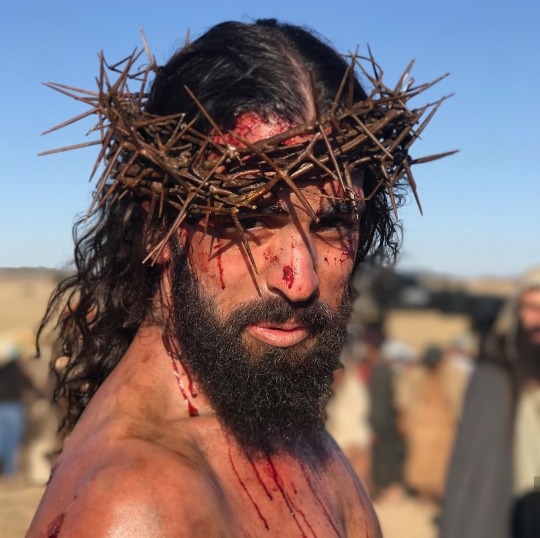
Adam Bond as Jesus in Good Omens (2019)
Like Adam, he was raised as a human -- being a human incarnate was his WHOLE DEAL in Christology. In the beginning was the Word, and the Word was made flesh and dwelt among us... yada yada yada.
UNLIKE, Adam, though, Jesus wasn't able to REJECT his Destiny of Dying Really Horribly and Painfully on the Cross. Narratives in the Bible also made it clear that the Crucifixion was NOT his Will, but that of God's. Like... him begging to be spared from torment but ultimately following God's Will is such an important event entire devotional practices are made out of it.
"39 And he went a little farther, and fell on his face, and prayed, saying, O my Father, if it be possible, let this cup pass from me: nevertheless not as I will, but as thou wilt."
- (Matthew 26: 39, KJV)
We get a glimpse of that in s1ep3 of Good Omens, too:
"JESUS
(muttering through the pain)
Father, please . . . you have to forgive them . . . they don’t know what they are doing . . .
Crowley, in black, comes up next to Aziraphale.
CROWLEY
You’ve come to smirk at the poor bugger, have you?
AZIRAPHALE
Smirk? Me?
CROWLEY
Well, your lot put him on there.
AZIRAPHALE
I am not consulted on policy decisions, Crawley."
- (The Quite Nice and Fairly Accurate Good Omens Script Book, 2018)
SO. Here we have the character of the Christ whose free will and agency had been STRIPPED from him in the guise of a "noble sacrifice." He comes back again on this Earth to fulfill another "inescapable destiny."
Aziraphale and Crowley need to stop him. The solution the Good Omens narrative offers to "inescapable destinies and systems" (both in s1 and s2) is for the character to realize they have the freedom to choose their own fates. It happened with Adam, and it happened with Gabriel, and perhaps it will happen to Jesus.
(At this point my sister frowned and said: "Are you telling me you think Aziraphale and Crowley are going to help Jesus realize he has agency and that him Dying on the Cross for the 'Great Plan' was kinda fucked up actually?" which sounds crazy when you put it like that BUT NEVER SAY NEVER BABIE.)
Because that brings me to my second point: if this all happens, Jesus becomes an AZIRAPHALE parallel.
In the same way Anathema is an Aziraphale parallel and Sergeant Shadwell is an Aziraphale parallel. Here is a character stuck in a suffocating status quo. To save the world, he needs to know he can escape that status quo and decide for himself. In the same way Anathema has to learn how to stop being a descendant or Shadwell to stop being a Witchfinder, or Gabriel to stop being an Archangel, and Adam to stop being an Antichrist, perhaps Jesus has to learn he can stop being... Well, the Christ, as well.
And this, of course, supplements Aziraphale's journey of letting go of the idea of being an idealized vessel of God, so he could finally enjoy the freedom of personhood and choice on Earth, with Crowley.
Or they could turn Jesus into a cackling villain who Aziraphale and Crowley need to kill in season 3, and I'd probably eat that up, too.
#good omens#good omens meta#good omens 2#good omens season 2#good omens spoilers#ineffable husbands#aziracrow#this was such an insane meta post to make but i had to do it#putting my religious trauma to good use iktr#enna rambles
591 notes
·
View notes
Text
Seamstresses and Miss Cheng's Fan
Швеи и веер мисс Ченг
По-русски ниже. / In Russian further.
There are many symbols, parallels and references in the second season of Good Omens. It is interesting to talk about a scene in which you can find a spicy reference to the final fifteen minutes.
Mrs. Sandwich at the ball in the bookstore tries to explain to the Chinese Miss Cheng what her girls do, but she cannot pronounce the truth: instead of the name of the oldest profession, she only gets the word "seamstress".
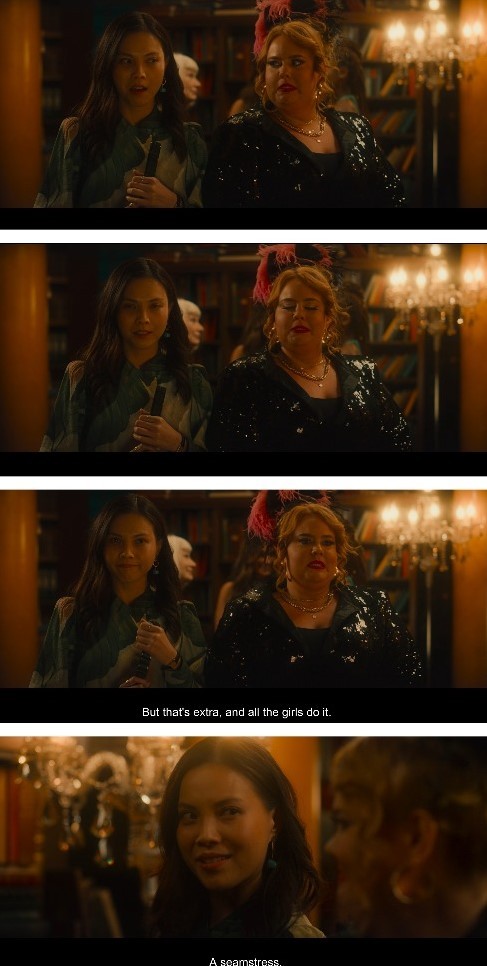
In addition, there is a cute reference to the events of the world of Terry Pratchett, where prostitutes were allegorically called "seamstresses". Moreover, it was mentioned that a real seamstress is now impossible to find, and if someone really just needs to sew something, then it will be difficult for him.
But now I draw your attention to the impossibility of pronouncing anything. Nevertheless, Mrs. Sandwich finds suitable allegories.
Cheng: What exactly is your profession? Sandwich: I'm a seamstress. Cheng: Indeed a worthy craft. [LAUGHS] Sandwich: No, I'm not a seamstress. I'm a seamstress. The devil take it. Cheng: A seamstress. Sandwich: What, in short? Cheng: You are a seamstress. Sandwich: No, I'm not a benighted seamstress. I'm a God forsaken… seamstress. [LAUGHS] Why can I not say the word seamstress. Cheng: Perhaps if you were to describe the profession. Sandwich: Nah, the very thing, I thank you. Well, when a gentleman finds himself in want of the tender attentions of a wife, he may take himself to my establishment and there have his pick of a fine stable of ladies all able and willing to mend his shirt or darn his socks or even… sew on a button. But that's extra, and all the girls do it. Cheng: Oh. A seamstress. [LAUGHS]
Do you remember Miss Cheng's reaction to this description and what she did with her fan? I hope you noticed how she stroked the fan along its entire length?
So, there you go, Miss Chang was standing on the left, and Mrs. Sandwich on the right. Just like Aziraphale and Crowley in the final scene, when Aziraphale was pretending to be happy, and Crowley was trying to explain himself. And Crowley (the one on the right, like Mrs. Sandwich) also couldn't say directly what he meant and what he was ready for. It would be fine if only the characters' positions in the frame were different, but the allegorical communication is already worthy of being considered a parallel.
In addition, colors play an important role in the symbolic system of the season. Mrs. Sandwich is dressed in black at the ball, and her hair is decorated with black and pink feathers. Black and shades of red are Crowley's colors. Miss Chang's earrings and clothes are a discreet blue-green color. Blue is Aziraphale's color. In addition to tartan, his colors are various shades of blue.
Well, well, if we believe the scene-hint, we can assume that Crowley was ready to offer Aziraphale even (!) to sew on a button! Only he expressed himself somewhat figuratively.

However, Aziraphale (the one on the left, like Miss Chang) understood everything perfectly well and, if we are to believe the scene-hint, we can assume that he reacted to Crowley's words in the depths of his soul in the same way as Miss Chang, whose thoughts the fan shows to the viewer.

In my opinion, the only thing that spoils the piquant analogy is that the gentlemen pay money to Mrs. Sandwich's girls. It would be good to add an explanation here that the demon, on the contrary, is ready to do all this for free! Otherwise, it turns out somehow awkward. And what do we see at the door of Mrs. Sandwich's establishment? There is a notice hanging there: "Don't pay the guy with the blue glasses. He doesn't work here!!!"
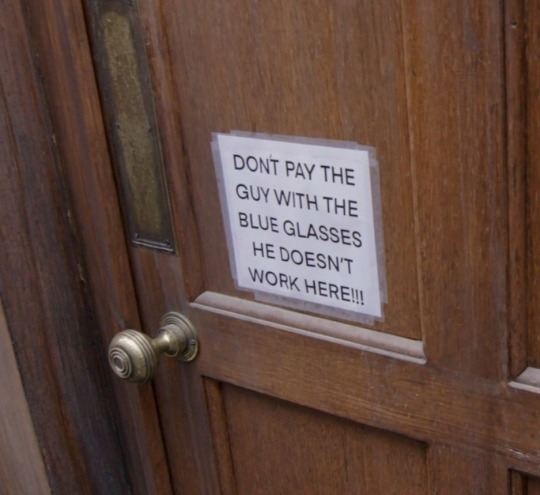

Well, yes, in blue, because "in black" would have been too transparent a hint! Well, we were explained that in this mercantile sense, the parallel should not be drawn. Crowley, unlike Mrs. Sandwich's girls, is completely selfless in his desires.
No, come on, naughty boys, huh?! I laugh at the fan, but now twice as hard, because the fan, it turns out, is also about Aziraphale.
All my posts with analyses are here.
***
Во втором сезоне «Благих знамений» есть множество символов, параллелей и отсылок. Интересно поговорить о сцене, в которой можно найти пикантную отсылку на финальные пятнадцать минут.
Миссис Сэндвич на балу в книжном пытается объяснить китаянке мисс Ченг, чем занимаются её девочки, но не может выговорить правду: вместо названия древнейшей профессии у нее получается только слово «швея».
Кроме всего прочего, здесь есть милая отсылка к событиям мира Терри Пратчетта, где продажные девушки иносказательно назывались «швеи». Притом упоминалось, что настоящую швею теперь не найти, и если кому-то действительно надо просто что-то пришить, то ему будет сложно.
Но я сейчас обращаю ваше внимание именно на невозможность что-то выговорить. Тем не менее миссис Сэндвич находит подходящие иносказания.
Ченг: Какая у Вас профессия? Сэндвич: Я швея. Ченг: Действительно достойное ремесло. Сэндвич: Нет, я не швея. Я – швея. [смеется] ��ерт побери. Ченг: Швея. Сэндвич: Что ж такое? Ченг: Вы швея. Сэндвич: Нет, я не тупая швея. Я богом забытая... швея. [смеется] Почему я не могу сказать слово «швея»? Ченг: Может быть, если бы Вы описали профессию... Сэндвич: Хм, это то, что нужно, благодарю Вас. Ну, когда джентльмену нужно нежное внимание жены, он может обратиться в мое заведение, и там у него есть выбор из прекрасной компании дам, все они могут и готовы охотно зашить ему рубашку или заштопать носки, или даже... пришить пуговицу. Но это уже дополнительно, и не все девушки этим занимаются. Ченг: О. Швея. [смеется]
Все мы помним реакцию мисс Ченг на это описание и то, что она вытворяла со своим веером. Заметили, надеюсь, как она этот веер поглаживала вдоль по всей длине?
Так во-о-от, мисс Ченг стояла слева, а миссис Сэндвич справа. Как и Азирафель с Кроули в финальной сцене, когда Азирафель притворно радовался, а Кроули пытался объясниться. И Кроули (тот, что справа, как миссис Сэндвич), тоже не мог выговорить прямо, что он подразумевает и на что он готов. Ладно бы только положение персонажей в кадре, но иносказательное общение — это уже ��янет на параллель.
К тому же в системе символов сезона важную роль имеют цвета. Миссис Сэндвич на балу одета в черное, а прическу украшают черно-розовые перья. Черный и оттенки красного — цвета Кроули. У мисс Ченг сережки и одежда неброского сине-зеленого цвета. Это цвет Азирафеля. Помимо тартана, его цвета — различные оттенки синего.
Так-так, если верить сцене-подсказке, мы можем предположить, что Кроули был готов предложить Азирафелю даже(!) пришить пуговицу! Только выражался несколько иносказательно.
Тем не менее Азирафель (тот, что слева, как мисс Ченг) всё прекрасно понял и, если верить сцене-подсказке, мы можем предположить, на слова Кроули он отреагировал в глубине души аналогично мисс Ченг, мысли которой зрителю выдает веер.
На мой взгляд, пикантную аналогию портит только то, что девушкам миссис Сэндвич джентльмены платят деньги. Хорошо бы сюда добавить пояснение, что демон, напротив, готов делать все это бесплатно! А то как-то неловко получается. И что же мы видим у дверей заведения миссис Сэндвич? Там висит объявление «Не платите парню в синих очках. Он здесь не работает». Ну да, в синих, ведь «в черных» было бы слишком прозрачной подсказкой! Что ж, нам пояснили, что в этом меркантильном смысле параллель не нужно проводить. Кроули, в отличие от девушек миссис Сэндвич, совершенно бескорыстен в своих желаниях.
Нет, ну шалунишки, а?! Угораю с веера, но теперь с удвоенной силой, потому что веер — это, оказывается, и об Азирафеле.
Упомянуты материалы о надписи у дверей заведения из статьи.
Все мои посты с разборами - здесь.
#good omens#ineffable husbands#aziracrow#aziraphale#crowley#good ineffable omens#ineffable spouses#good omens parallels#good omens references#good omens analysis#good omens meta#good omens clues#good omens theory#good omens thoughts#good omens theories#good omens details#ineffable mystery#go meta#final fifteen#the final fifteen
40 notes
·
View notes
Text
Sovereignty, Citizenship, and the Bookshop
Credit to @flameraven for scripts
Read on Ao3 at: Sovereignty, Citizenship, and the Bookshop (1702 words) by indigovigilance Summary: The rules regarding who may enter the bookshop, and who may give others permission to enter the bookshop, are revealed by events rather than exposition. Parallel themes surround the Bentley. In this meta I generate a theory of sovereignty and citizenship as it pertains to the Bookshop, and what that implies about a statement Crowley makes and Aziraphale's final decision in S2E6.
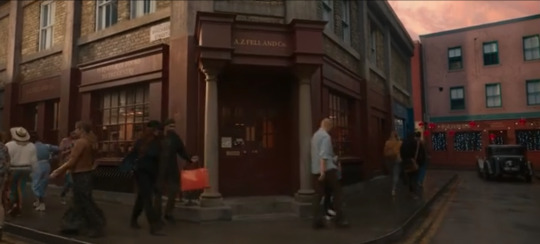
What actually is the Bookshop?
First, Aziraphale explains to Crowley:
S2E5: AZIRAPHALE: We're perfectly safe in here. Technically, this bookshop still counts as an Embassy.
But then, speaking to Shax, Aziraphale further defines the bookshop:
AZIRAPHALE: Out of the question. Might I remind you, that this bookshop is technically an independent embassy. Being a former outpost of Heaven, and as such…
Which doesn't actually make any sense.
An embassy, by definition, is a satellite of another larger nation. It is usually the residence of an ambassador, and is considered the "soil" and jurisdiction of the home country, regardless of where it is in the world: "An embassy is considered “foreign soil,” meaning that it operates under the jurisdiction and laws of the home country, not the host country (the country where the embassy is physically located)." [ext source]
So an embassy, by its basic definition, cannot be independent. It's an oxymoron. I'll interpret this to mean that the Bookshop constitutes its own nationstate (and that Aziraphale just doesn't say it that way because he's a funky little guy).
Bookshop: A Sovereign Nation of Two
There has been extensive discussion about why Crowley seems never to have told Aziraphale that he was living in his car, and why, if/when Aziraphale figured it out, he didn't say anything about it. (I wrote a meta discussing how we know that Aziraphale knows by the beginning of S2E4 that Crowley is living in his car. Additionally, in S2E6, Aziraphale doesn't seem to look particularly surprised when Crowley announces to the room that he's tired of living in his car; you can interpret this as being distracted and phased out but I don't think Aziraphale is ever so dissociated that he would miss a statement like that and simply not react. So by then, he certainly knows.)
I posit that Crowley did not ask to move in and would have refused to do so even if offered for one very simple reason: moving in would have made him a citizen of Bookshop, and therefore a point of vulnerability for Aziraphale. Because as he explains to Shax in S2E3, he can't technically invite her in:
SHAX: if you won't let me in… CROWLEY: Not technically something I can do.
Of course, Crowley is a demon: he could be lying. But let's take the statement at face value, since Shax, also a demon, who seems reasonably familiar with the rules of entry, doesn't question it. So Crowley, by never establishing citizenship, ensures that he can never be coerced or tricked into letting anyone into the Bookshop. He maintains his foreign entity status on purpose to protect Aziraphale.
One more note, in passing: Crowley stays at the shop in S2E3 and S2E4, but he has been charged by Aziraphale to "mind the bookshop, and Gabriel." His role is more akin to a house-sitter than a houseguest. He's there on work visa, and it does not establish citizenship.
So Crowley isn't a citizen of Bookshop. But someone other than Aziraphale is.
S2E1: MAGGIE: I can be out of here in two weeks. AZIRAPHALE: Out of here? Why? Don't you like it anymore? MAGGIE: Oh, Mr. Fell, I love this shop! I've loved it since I was a baby. But I know how behind I am on rent. (…) MAGGIE: You can't just forgive me eight months' rent. AZIRAPHALE: Oh, I can. I'm very good at forgiveness. It's one of my favorite things. Now, you have paid your rent, I have my music, and I know exactly what I'll be doing for the next 21 minutes. [he giggles and leaves] (creepiest most disturbing giggle in all of cinematic history BUT ANYWAYS)
We've established that Maggie not only is a tenant of land owned by Aziraphale, but that her accounts are all paid up. Her citizenship (or at least, permanent residency) is secure. If simply renting out the space wasn't enough, we learn that she is a fourth-generation resident of the space owned by Aziraphale, which started inside the bookshop itself, and so Maggie may have been born into citizenship. Either way, the consequences of this arise in S2E6:
AZIRAPHALE: Maggie, what just happened? MAGGIE: I… I think I might have just told them they could come in.
Crowley can't tell demons that they can come in. But Maggie can. My explanation for this is because she actually lives (and is up on her rent) in a territory of the nation of Bookshop. It could be posed that Maggie can invite demons in because she is a guest of the ball, and so this is a temporary power, but Crowley was a "guest"/house-sitter and didn't have this power, so I reject this explanation and affirm it as a citizenship/residency power.
The Metatron's Offer
At time of writing, the fandom has spent two months trying to figure out why Metatron offered Aziraphale the job of Supreme Archangel. Was it to get him back into Heaven where he can keep a closer eye on him? Was it to get him away from Crowley? Did Metatron realize that he is a wellspring of power and wants to tap into it for nefarious purpose?
I'm going to propose a different, much simpler reason: he needed to get Aziraphale out of the bookshop. To explain that, we look to a line that Crowley delivers during the Conversation:
CROWLEY: I mean, if Gabriel and Beelzebub can do it, go off together, then we can. Just the two of us. We don't need Heaven, we don't need Hell, they're toxic. We need to get away from them, just be an us. You and me, what do you say? AZIRAPHALE: Come with me… to Heaven. I'll run it, you can be my second in command. We can make a difference. CROWLEY: You can't leave this bookshop.
Hang on, didn't Crowley just say that they should run off together? Why is he now saying that he can't leave the bookshop? These statements seem contradictory, but through the lens of sovereignty, they're not. You see, if Aziraphale goes off to Alpha Centauri without rejoining Heaven, the Bookshop still belongs to him and constitutes the sovereign nation over which he rules. It is the anchor and touchstone of his independent status. What ever new residence they establish will, in turn, be an embassy of that "independent embassy." The Bookshop then (I hypothesize, and posit that Crowley does too) grants Aziraphale protection from Heaven and Hell no matter where he is in the universe.
A Brief Aside on the Mechanics of Satellites
We have some evidence that Bookshop rules extend to wherever Aziraphale happens to be "residing," in that when Aziraphale borrows Crowley's car, Shax must trick him into giving him permission to enter (S2E4):
HITCHHIKER: I'm so sorry, can you be an angel and give me a lift? Only m-my car's broken down and my phone's dead. Just to the next town, there's a garage there. AZIRAPHALE: Oh… yes, well… I suppose you better climb in, then.
Thus establishing that, theoretically, Crowley and Aziraphale could "go off together" and still have the protection of the Bookshop.
The Consequences of Aziraphale's Final Decision
Crowley tells Aziraphale that he cannot leave the bookshop, but then we know that Aziraphale takes the job and ascends to Heaven. Metatron looks extremely relieved. No sooner do they ascend than Muriel enters the bookshop, where we know Metatron has placed them. Let's take this point by point.
The Bookshop is no longer a sovereign nation
By rejoining Heaven, Aziraphale has reclaimed his citizenship as an angel of Heaven. I'm going to go ahead and say (for sake of argument and because it is thematically consistent) that Heaven does not honor duel citizenship. Therefore, Aziraphale has given up his citizenship of Bookshop, but as it still belongs to him, it is now territory subject to the jurisdiction of Heaven. Muriel has been placed there as a representative of Heaven. Having been (we can surmise) the only "independent embassy" in existence where both angels and demons had to ask permission to enter, it is once again a good and proper embassy of Heaven.
This is important because now, neither Aziraphale nor Crowley have any place to go that is protected from both Heaven and Hell.
Muriel has unfettered access to Aziraphale's collection of books
My very simplistic theory for why Metatron went to so much trouble to get Aziraphale to cede control of the Bookshop is that he needs access to his collection of books. Specifically, he needs a certain Scrivener who enjoys reading to set up camp there and peruse every single book. This is because he is looking for something.
Gabriel left Heaven with a large box; he arrived at the Bookshop with an empty box. We can punt around all sorts of possible reasons but let's say, for sake of conjecture, that Gabriel stole the Book of Life on his way out to protect himself and Beelzebub from erasure. We don't know where the Book is now, but Metatron (who doesn't know the box was empty) has good reason to believe that the Book of Life is somewhere in the bookshop. But it's too dangerous to admit that they've lost track of it, so the best way to find a Book in a bookshop is to get the owner out of there, install an avid reader as steward, and wait patiently.
Other consequences of this theory of citizenship
We are given to believe that Crowley and Aziraphale are both outcasts of Hell and Heaven, respectively, yet Aziraphale seems to be the only one of them that benefits from the protections of independence. We could say that it is because Aziraphale owns land, and so that allows him to establish a nationstate, whereas the Bentley does not, but since Aziraphale brings the protections of independence with him when he borrows the Bentley, that seems flimsy. I find it more likely that in S3 we're going to learn something about Crowley that explains why he lacks these protections, and if I dare to make conjecture, it will be the subject of another meta.
I didn't get around to a discussion of the consequences of Aziraphale throwing his halo and "declaring war," or that war declaration being maybe-cancelled by Crowley; suffice to say, that may again be it's own meta.
~~~
If you enjoyed this, you may enjoy: Honolulu Roast: the story of a coup
another meta on the topic of ownership re the Bentley by @ineffable-endearments can be found here.
~~~
edit: I was reminded by @rekishi-aka to note that in S1, Gabriel and Sandolphon walk right in, because at that time the bookshop is an embassy of Heaven. For all of S2 except the final 30 minutes, celestials all have to ask permission to enter, including Michael, Uriel, Saraqael, and Muriel, because the Bookshop is independent. After Aziraphale throws his halo, celestials just appear inside the Bookshop: by declaring war, Aziraphale has relinquished his protection. It's unclear whether it would have been reestablished by Crowley cancelling the war, but it's a moot point because then Aziraphale agrees to become the Supreme Archangel.
#good omens#good omens 2#good omens meta#aziraphale#crowley#ineffable husbands#neil gaiman#good omens maggie#muriel#good omens muriel#maggie#metatron#fuck metatron#ivoc
210 notes
·
View notes
Text
I just. Ugh. Oh my God. The fucking PARALLELS this season of Good Omens. Y'all know I'm an absolute fool for a good parallel, so to get so many? I'm so well fed today
Crowley and Azira are like, the definition of soulmates of the kind that are made, you know? Like there is no one single other being in the whole of Creation that shares even a fraction of the same experiences. Six thousand years in the making, this ship is - even more according to this season !!! And YET, they are absolutely brand new. They've never been in a romantic relationship - not with each other, not with anyone - and as Crowley pointed out, they've essentially just gotten out of toxic relationships with Heaven and Hell. Except like, not really? Because we see Crowley really got out Heaven so heavily traumatized he never really put all that much stock into Hell. Yeah, Hell might've still been abusive, but Crowley was halfway out the door the whole time. Azira, tho... He still buys into all of it. He's technically out the door, but he hasn't done any of the deprogramming you need to do in order to move on (I feel like I'm mixing my metaphors a little by using cult-related languages, but also abusive relationships are essentially two person cults, so)
And this season sets this dynamic up so perfectly with Nina and Maggie!!!!! And we're supposed to think that Nina is Crowley because she's dark and broody and Maggie is Azira cause she's frankly precious but really it's the other way around and it's Nina who finishes the season being like "I can't be in a relationship right now because I still need to work on myself having just ended an incredibly toxic relationship" and it's just. Nina and Maggie don't end the season together because that's not what they need right now and bc of that they might still be able to be together later, but Crowley and Azira hold onto each other SO DAMN HARD that they end up losing each other SPECIFICALLY BECAUSE AZIRA CAN'T DO THAT SAME THING OF UNPACKING HIS BASE ASSUMPTIONS it's like leaving a cult cause they were mean to you once but still buying into the new agey stuff they used to love bomb you into joining the cult in the first place
And so that's the relationship part of things but also we've got like soo many parallels showing how broken the system is in the first place and obviously ineffable bureaucracy is what stands out here because of the literal lines coming out of various characters' mouths during this plotline but can we talk about how heavily brainwashed Muriel is and how clearly they're supposed to be exactly like a young Aziraphale, one who doesn't "have" Crowley yet!!! Like tell me that if you gave Muriel a fiery sword and told them to watch over the first ever pregnant couple in history they wouldn't give them that Goddamn sword. Nobody on either side is capable of questioning their position in life without exposure to Something Else, but it doesn't have to be like, the being you're going to run off to alpha centauri with. It could very much be a copy of The Crow Road
(sidenote, has anybody read this book? It seems like an incredibly deliberate choice but I've never heard of it! I think I might send in an ask to Neil Gaiman himself if I don't see any meta soon)
Anyway yeah um. I don't know how to end this. Parallels and shadow selves fuck (double entendre)
#ok I lied I do have Thoughts I just hadn't processed them yet#parallels are like my favorite thing#good omens#good omens 2#ineffable husbands#ineffable bureaucracy#crowley#aziraphale#good omens spoilers#gail speaks
198 notes
·
View notes
Text
I'll draw something for it later bc brainrot is a very real thing but
There's something about Slay the Princess and Good Omens that make them function together perfectly.
(Spoilers ahead, youve been warned you silly goose)
~~~
Think about it.
The Princess/The Shifting Mound is the very concept of Change, the embodiment of progress and the ideals of movement. An elegant and haunting design that envelops the personification of worldly development.
Crowley is a Demon, a Fallen Angel who was punished simply for daring to suggest changes. His entire existence is spent along the fence line of "Good" and "Bad", always rebelling in little ways to somehow better the world around him. Throughout the years he basically never wears the same thing twice, always switching up his hair, his outfit, even biological presentation. It always changes. He always changes. He wants nothing more than for the things around him to change, too.
Aziraphale is an Angel, a direct counterpart to Crowley. He always wants to maintain balance in all things. Good and evil, right and wrong, black and white. He rarely changes, and when he does it's something small. His haircut has, for the most part, been the same since the Beginning, and for heaven's sake he's been wearing the same stuffy old waistcoat for nearly two hundred years now. He collects bits and baubles from all over, constantly clinging to pieces of the past. He doesn't act on anything unless he's left with no other choice (often waiting on Crowley to act for him tbh), and doesn't even think about crossing a line unless he knows it's completely safe.
The Long Quiet/Hero/Player is, much like the Princess, a concept. They are the perfect counterpart to her, the idea of stillness. Stagnance. The personification of unending silence, an unchanging and unmoving existence. They were created to counter her, designed from the start to bring an end to Change itself. If successful, they are sentenced to an eternity of nothingness, which is somehow established as the 'good' end.
I'm sure you can see where I'm going with this.
Aziraphale and Quiet are both bound by the confines of their perceived reality, intended as little more than an implement for their respective 'leaders' (Heaven/Narrator) to utilize.
Crowley and Princess are both imprisoned in some way by those aforementioned 'leaders', and in doing so are also fully bound to Aziraphale and Quiet, in terms of their fates and futures. They were punished for their natures, and left to suffer because of it.
If given the opportunity to collaborate, the pair in question gets the best possible ending with one another, to the utter dismay of their superiors (even if the consequences of doing so aren't really that bad).
In at least one of the endings of Slay the Princess, Quiet and Princess leave their prison together, and the world just...continues on. Just as it always has. Things continue to grow and change. Such is the nature of life, after all.
The Narrator is distraught by the very idea of this, though. He fears death, and change is uncertain and frightful. Thats why he did all this in the first place. He needed Quiet in order to silence Change.
If Crowley and Aziraphale were allowed to be together, then quite frankly nothing would change. If Gabriel and Beelzebub can do it, surely, so can they. A single, inconsequential pair among millions. "Worst"-case scenario, more demons and angels will meet up, and be all the better for it.
Heaven, of course, hates this. They refuse to believe that they are anything less than perfect "goodness", and refuse to let themselves associate with anything they see as "lower" than them (which is everything). They want order and control, and feel threatened by anything that even hints at undermining that.
Their respective narratives bring forth so much thought and intrigue, and to me its incredible how close their stories are, and the sheer amount of parallel between them.
"Youre on a path in the woods.
And at the end of that path is a cabin.
In the basement of that cabin is a Serpent.
You're here to Slay him.
If you don't, it will be the End of the World."
"Slay the Serpent"
#im gonna draw something for this soon i swear#slay the princess#stp narrator#stp princess#stp#slay the princess spoilers#stp spoilers#stp hero#the long quiet#the shifting mound#good omens#good omens au#aziraphale good omens#good omens aziraphale#aziraphale#aziraphale x crowley#good omens crowley#anthony j crowley#crowley good omens#crowley#slay the serpent
27 notes
·
View notes
Text
Brother Aziraphale: some interesting parallels
I got a bit into the Brother Cadfael mysteries by Ellis Peters and their mid-90s TV adaptation a couple of months ago, and my GO-saturated brain being what it is, I started picking out some fun coincidental parallels :D
On with the rambling!
Some background: the Cadfael stories are historical mysteries set during the Anarchy, a civil war waged between 1138 and 1153 by King Stephen and his cousin Empress Maud (aka Matilda), King Henry I's only legitimate son having died in the White Ship disaster of 1120. It's a fascinating period in English history that's criminally under-represented in popular culture. The books are extremely well-researched in their historical detail and are worth reading for that alone even if mysteries aren't quite your thing; the TV series is a tad variable in its level of faithfulness to the books, but it's good solid television with some excellent performances (see below for my favourite).
Cadfael himself, a Welshman by birth, is a former soldier and sea captain, having taken part in the First Crusade and travelled extensively in the Middle East and other places, learning medicine and generally gaining a great deal of worldly experience, before returning to England in his forties and taking the cowl, becoming the apothecary at the Abbey of St Peter and St Paul. His greater experience of the world and particular views on justice and fair play (which seem anachronistic but are actually neo-Aristotelian; perfectly accurate for the time period and character backstory) tend to clash with the other monks, who took their Benedictine vows much earlier in life and so tend to be less wordly and more doctrinaire. Cadfael is fiercely intelligent and compassionate, and if presented with a choice will always go for doing the good thing as opposed to the lawful thing, as he understands them. Luckily for him, though, he doesn't have to contend with Metatron-esque arseholes overmuch; the two abbots he serves under in the stories, Heribert and Radulfus, are very firmly reasonable authorities.
So now to those parallels I mentioned!
Cadfael:
Former soldier, still fully capable of defending himself or others in a fight
Considerable worldly experience and very well-travelled; consequently well-acquainted with human nature in all its facets and frailty
Has much to do with a literal garden, used for medicinal plants
Part of a religious order/organisation that is, all things considered, fairly healthy
Intelligent, compassionate and open-minded, which sometimes puts him mildly at odds with the other monks
Prefers to do what is good rather than simply following the rules
Welshman, played on TV by an English actor
Aziraphale:
Likewise a former soldier and fully capable of physically defending himself or others should it become necessary (see here for some of my analysis/speculation on this)
Considerable experience of the world through having been living there since the literal start, and is accordingly well-travelled; very familiar with humans and human nature
Is connected to both a literal garden and more metaphorical ones; the 'medicinal herbs' he grows in the latter are likewise metaphorical ( @vidavalor has a great deal of very good meta on gardens in GO; this post is a good recent example)
Teeeeeeeeeeeeeechnically part of a religious organisation, but one that's so ghastly that 'unhealthy' barely scratches the surface
Intelligent, compassionate and open-minded; the ways this puts Azzy at odds with Heaven are literally the whole dang plot! XD
Prefers doing true and genuine good, and [bleep] Heavenly Rules -- though Az seems fairly law-abiding wrt human laws that aren't complete [excrement]
Technically English, portrayed on TV by a Welsh actor
And one final thing -- the scene in 'One Corpse Too Many' (the first episode of the Cadfael TV show) that establishes Cadfael's character for the audience is one that I particularly like because it's awesome in its own right, and also because the first time I saw it, my whole brain went, "Yep, that's what Aziraphale would do!" In the scene in question, Cadfael intervenes to protect a vagrant who's being hassled by a jerkass soldier of King Stephen, then calmly, politely, wordlessly, and with great economy of action disarms said soldier with his bare hands -- see the gifs below:
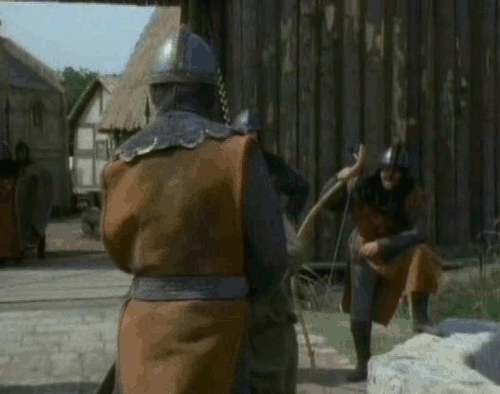
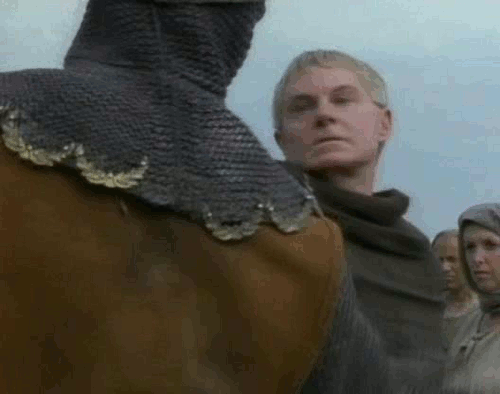
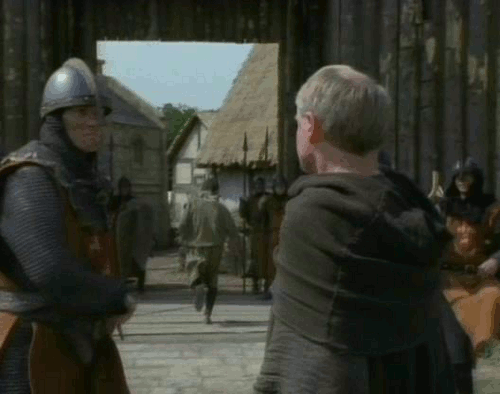
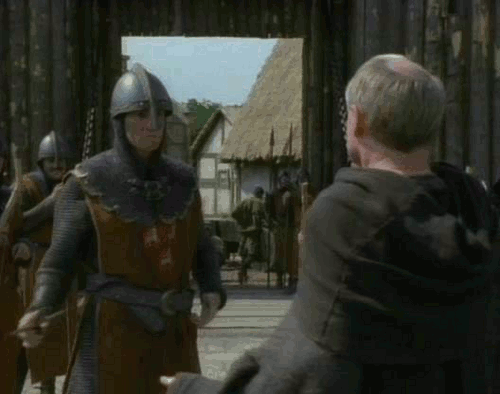
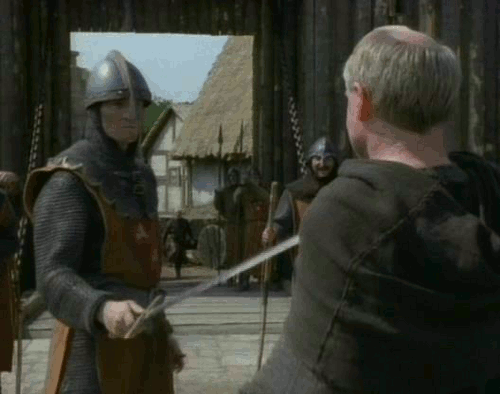
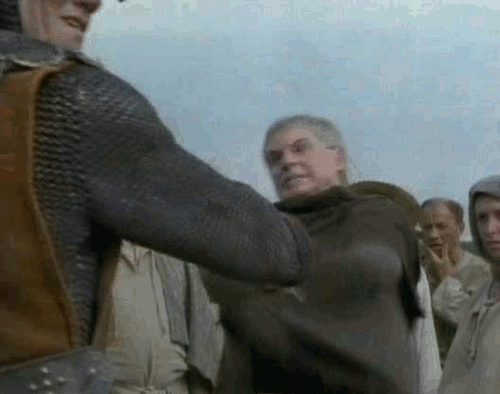
And if you're thinking, "Hang on a mo'! That guy looks familiar!", then yes, you are absolutely correct! The first time I saw the cover of my grandmother's Cadfael DVD boxset, I actually had a bit of a knee-jerk fear reaction -- as in, reflexively yeeted myself halfway across the living room backwards -- simply because Derek Jacobi's performance in The Final Fifteen was just that effective! (Nothing was bruised except my dignity, and the only witnesses were a cat or two, who've so far kept quiet about it) He is just as skilled at playing good/heroic characters as he is at portraying terrifyingly evil villains :D
It's impossible to say, now, whether or not Terry Pratchett was consciously influenced by the Cadfael Chronicles when working up Aziraphale's character, but given that he was a voracious reader and Brother Cadfael made his print debut in 1977, it's reasonable to assume that he was at the very least aware of them. Certainly, they were a part of the referential sea in which he was swimming while writing Good Omens -- and I bet you anything the Ineffable Husbands like the books as well! (I'm less certain about whether they'd watch the TV series, though, given the lead actor's uncomfortable resemblance to the Metatron)
Thanks for reading!
9 notes
·
View notes
Text
The Three Final Acts
A look into the magic show in the title sequence pt.1
We start outside the theatre and we see a giant turnip in the background and it is raining rabbits which are two tricks that are used as opening acts and then we get our first finale act - sawing in half - all before we even enter the theatre - almost like these are the acts that are setting the stage for what we are about to see - and when we enter we get two more big show stoppers - the bullet catch and the wheel of death with a bunch of cameras watching that weren't outside the theatre
So in that short sequence we get three big magic tricks that all have a common theme of a risk of death and an intense level of trust involved
But we only get the bullet catch this season so where do the other two come in? I think it is meant to show one for each season - so let’s get into it
Season one - sawing in half
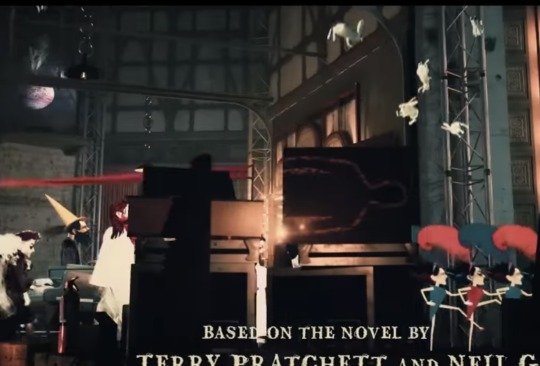
Now you are going to have to hear me out for this one because while we do get magic tricks in this season (ex: the card/baby swap and aziraphale's show) this act is obviously not one of them so lets look at the basics of what this trick is - you have a big sharp cutting thing used to separate a person’s legs from the rest of their body, it is a major level of trust of the other person to do their part and a lot of tension that someone could get hurt - this narrow downs which scenes would be appropriate and think I've concluded it's at the airbase when Crowley collapses as Satan is coming and Aziraphale picks up his sword and tells Crowley to do something or he will never talk to him again
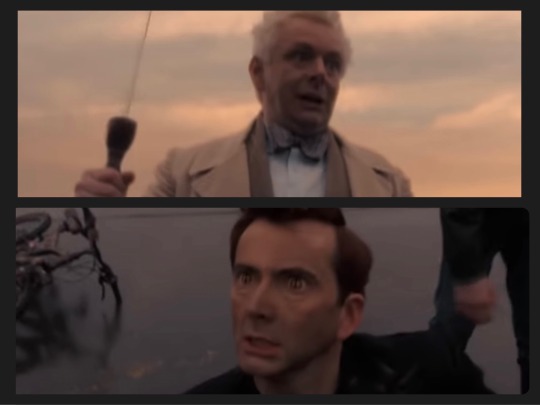
Have I lost you? Understandable it’s a bit of a stretch but it does have all the elements - Aziraphale with his sword (big sharp cutting thing) Crowley without his legs and the tension is similar to the bullet catch both of the to afraid to hurt the other - also in the title sequence the "cameras" are not watching this trick - it's under the radar - a surprise act - just like they have been till this day.
Season two - bullet catch

This one is pretty obvious with the actual act in a flashback and it is such a great scene truly - the tension, the vulnerability, the trust -just everything about it amazing - but we can't ignore the parallels in the final 15 and that’s what is mainly important. You have the iconic "aim for my mouth shoot but shoot past my ear” line that is a parallel to the kiss. You have the tension and vulnerability that feel the same and on some level the trust too. But also in the title sequence the audience is full of cameras which could just be a nod to furfur but if it is meant to parallel the final 15 that would imply they were being watched - I’m looking at you Metatron. In all these moments so far it has been Crowley that has been doing the thing - the gunfire, the kissing, the time stopping, the fall - while Aziraphale has been setting the stage, doing the pushing - truly a musician and his assistant
Season three - the wheel of death

Now for what started this whole thing - the last finale act we see in the title sequences - a three person act for our duo - to stay on theme with the rest of the acts it will parallel a big final moment that is putting them and their relationship on the line and we can only speculate on how - but I will explain how the trick works before this ends. So as mentioned before you need three people to pull this off - the knife thrower who does a slight of hand trick to put the knives in their pocket instead of throwing, the target who is strapped to the wheel, and a person behind the wheel who is actually in charge of getting the knives on the target by pulling and releasing knives through hidden gaps on the wheel perfectly in sync with the thrower to make it look realistic or you can just watch a video here
what this all means?
With all these acts you can see some pretty consistent themes and how they can parallel pivotal moments for Aziraphale and Crowley. Just know this next act is truly going to be their biggest and all eyes are on them - who will they bring in to help
edit: pt.2 here
#pls let this make sense#i need to stop writing analysis after midnight#it made sense in my head#idk if i explained it well enough#good omens#good omens 2#good ineffable omens#good omens meta#good omens title sequence#good omens magic trick#good omens analysis#good omens theory#aziraphale#crowley#aziracrow#ineffable husbands#ineffable spouses#aziraphale x crowley
90 notes
·
View notes
Text
Good Omens Fic Rec: Collaborative Activities
In that moment, Aziraphale knew his destiny. He was destined for a day of tiresome bickering with a devastatingly handsome and soul-crushingly insufferable man. If he walked out now, he could convince the young executive assistant in charge of the phones to give him his. She seemed to like him, maybe had the littlest crush on him. Once he had his phone, he would email his resignation to Gabriel and polish his resume on the plane home to the city. “Fell!” Aziraphale did his best to smile, pushed away thoughts of fleeing his godforsaken job for good. A grown man, he was a grown man who could make it through one long weekend of asinine activities. While on a corporate retreat, estranged co-workers Aziraphale and Crowley get teamed up together. They encounter something on their hike, something that brings a buried desire to the surface and transforms it into an unquenchable lust.
Length: 12,776 words
AO3 Rating: Explicit / Spice Level 🔥🔥🔥🔥🔥
Best for: After Dark, Human AU, Mystery
Triggers: None
Read it here, fic by scullyphile
*Minor Spoilers* It's not often that I can write a rec post immediately after reading a fic, but I'm able to now, and more than that, I'm BUZZING to talk about this fic!! This was so good!!
In this human AU, Crowley and Aziraphale are coworkers at an advertising firm with a complicated past. Right off the bat, it's a setting that works perfectly. Aziraphale works on an upper level and Crowley on one of the lower ones, so it parallels perfectly to the canon of Heaven and Hell being different levels of the same office building. Aziraphale hates Crowley for reasons you'll find out, and when he is paired up with him for a company-mandated hike, well, he's not happy. I loved their chemistry, the banter, the stupid puns. Really, everything in the first half of the story kept me super engaged and fulfilled even if it had ended there.
But then we get to the next half of the story. Here is where it went into overdrive for me. It's a much more casual fandom for me, but I've been an X-Files fan since childhood. Usually, the plots of episodes are really hazy for me until I'm actually rewatching them. So, it took me a while to make the connection on the "loosely based on an X-Files episode" tag. Ohhhh, what a genius inspiration!!! This is a sex pollen fic, so expect some uncontrollable sexual urges. But more than that, expect things to not be as they appear. I simply cannot say more, you need to find out for yourself how this plays out.
This is so, so, so much fun. I loved this a lot. My only complaint is that it's not a million words long and it ended. Please, more X-Files inspirations/crossovers. Oh my god, I didn't realize how much I needed that. After dark read that I hope you guys also enjoy!
Read it here, fic by scullyphile
#good omens#good omens fanfiction#good omens fanfic#fanfic rec#aziracrow#good omens fic rec#aziraphale x crowley#Collaborative Activities#scullyphile#human au#after dark#short#five flames#crossover#mystery#sex pollen
41 notes
·
View notes
Text
First-Order Archangels
Part 2: Foils of War
This post follows on from Part 1: Maybe You'll See An Archangel
In Part 1 of this meta we looked at some parallels between Gabriel and Crowley that were being shown to us in S2. This time we are going to focus on the differences, as well as some parallels between their partners, Beelzebub and Aziraphale.
A foil is a character who contrasts with the protagonist, to highlight or differentiate certain qualities between the characters. Crowley and Gabriel do this because they have come from essentially the same place, and share some story elements, but they still end up in different places.
Lets start with their first meeting in S2.

There's a couple of things about this scene worth noting. The first is Crowley's reaction. In my honest opinion, this is seems a a bit of an overreaction, even considering what happened during the body swap scenes. The reaction is more about something that happened to Crowley himself, not to Aziraphale, and my guess is its something to do with Crowley's Fall. But what exactly happened at that point, I can't say.
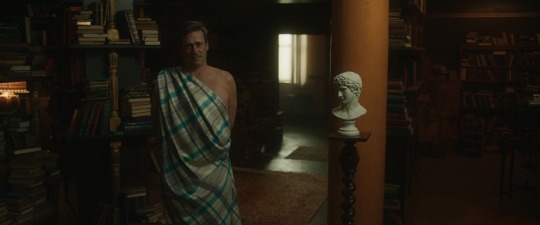
The second is the white bust. It does look like it is passing some kind of judgment on Gabriel there, and they are perfectly aligned in the shot-blocking, just as they were aligned over Crowley's shoulders before he turned around and saw Gabriel in the GIF above. (Yep. Go back and take a close look - Gabriel sits on Crowley's right shoulder, and the bust sits right on his left.)
I talked about what it represented here in Part 1 of Gabriel as a Shoulder Angel: S2 Study
This bust is identified in the meta A. Z. Fell & Co. bookshop and its statues by @youryurigoddess as the Head of the Victorious Athlete. The op applies an interpretation in context to Aziraphale but seeing how we get Gabriel posed next to it twice, perhaps we should have a closer look at what it might be trying to tell us about this angel as well. The op says: "The presented athlete is victorious because he’s the epitome of the Platonic Triad of higher Forms: Truth, Beauty, and Excellence, understood in the wider context of the Greek Aretē."
Arete is a nebulous concept, and while it meant one thing in the earlier post it is trying to convey a slightly different message here. Its about combining a number of qualities to live up to your best potential of excellence. Such a person would be displaying the highest levels of strength, courage and wit. Having been confronted with Gabriel unexpectedly, Crowley has just lost his wits and courage - for a moment, at least.
Gabriel, still stripped down and presented to us in a basic, classical style of robing, is dealing with one of the other aspects of arete. "See, told you I looked like a Gabriel," he says, standing on the angelic right-side. Truth is virtue, truth is knowledge, and in arete virtue is knowledge as well.
In vino veritas means "In wine, there is truth." It refers to the fact that people under the influence of alcohol tend to speak without filters.

We've already talked about one meaning for the red horse on the wine bottle Crowley obtains to do some thinking with once he's hit with Nina's comment about people's love lives in S2E5. Yes, everything on that table right there is about love. But if you read all the reblogs on that post-thread, a number of people also mention that red horses are connected to War (as in the third Horseperson of the Apocalypse that didn't happen - their horse, if they had one, is supposed to be red.)
Firstly, the date on the bottle impossibly old for reality (believe me, you will not find a bottle that old in a little cafe like that, not matter where you are) so it is more likely a fictional date to refer us to the year before WWII started, the last peaceful year for most people before widespread war broke out (hmm, a bit of foreshadowing there, maybe?)
Secondly, and more importantly, Crowley pauses to pick up the bottle with the passionate red horse of War* on it to take it with him when he goes to talk to Gabriel.
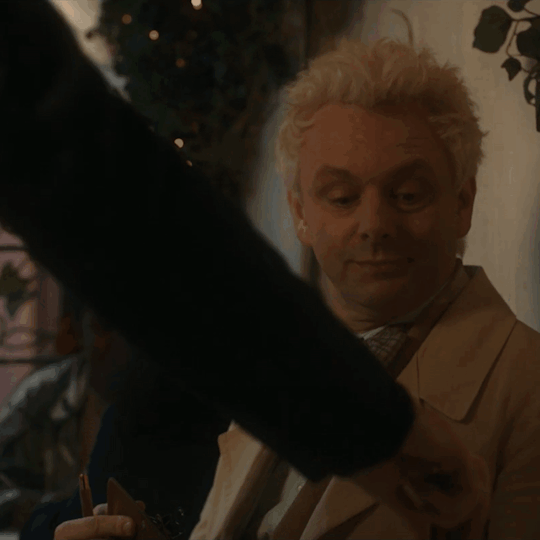
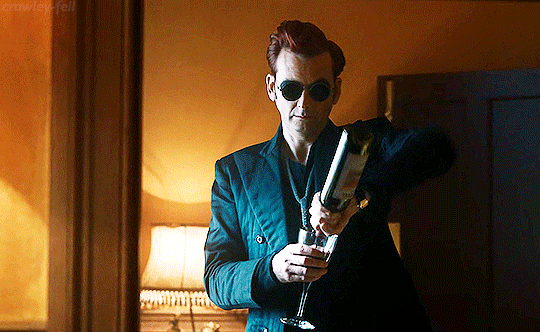
Oh, I'm not here to make peace, Crowley declares as he enters the room - look at the way he turns the label to face Gabriel as he enters - I'm here to do battle. Isn't that what you wanted, Gabriel?
(If you go back to the scene blocking for the following sequence, you'll notice that Crowley starts on the right-side, the side of Heaven, that wants to re-start and hopefully win the War, but Gabriel, who has changed his mind, is more on Crowley's usual left-side now, wanting peace instead.)
In S1 Gabriel was the one all for starting, or more rather, continuing a war that was never concluded, but now seems to be backing away from that, and Crowley just can't work it out.
The recording of the trial in Heaven gives some explanation as to why, but not the whole reason for Gabriel's back-down on war.
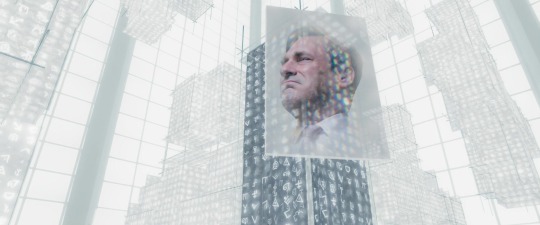
He is removed from the office of Supreme Archangel for the reason of "[refusing] to exercise your celestial authority." I'll come back to this shortly.
On the other hand Crowley will fight on the spot if required but would rather avoid a prolonged war if at all possible. And he doesn't hesitate to lay down his own authority to achieve that. Astonishingly, no one in the bookshop disputes this, and he quickly takes control of the gathered celestial councils.
CROWLEY: Nobody's at war. You idiots sent an idiot to lead a gang of idiots to attack a bookshop. Those idiots there want their Archangel back so they can fire him.

Then:
MICHAEL: [clears throat]If it is to be war… CROWLEY: No, no, no, no, no war. Aziraphale, let's sort this out. Where's the cardboard box?
Crowley gets Gabriel back to his true self, rescues the mortal humans from being turned in pillars of salt, asks Aziraphale to take over from him as he leads Maggie and Nina outside, and kindly remembers to retrieve Mr Brown from wherever he was being held in Hell (he was not killed, Neil commented on a tumblr post he was merely taken to Hell and held in a cell overnight; Crowley just retrieved him from that hell hole.)
(OK, so I had something else here at first but discussion on another post at the time of writing has led me to delete it. The main aim of my argument was to show that Crowley naturally took control of the room to avert war before the Metatron showed up - and no one disputed or objected to it.)
The word "authority" is used multiple times in Ep.6, so there is some emphasis on it being important. Once the demons left, and it was just the angels talking, Michael tried to take over:
MICHAEL: I am authorized to remove the name of anyone who helped Gabriel from the Book of Life. You will never have existed, Aziraphale. In the absence of Gabriel, I am the Supreme Archangel. URIEL: Duty officer.
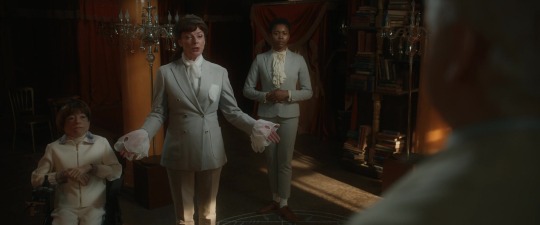
It wasn't the first time Michael tried to claim the position of Supreme Archangel on their own - with Uriel pushing back - and it brought to mind the famous saying "Power tends to corrupt; absolute power corrupts absolutely." I like to check the exact wording of well-known sayings such as this, because they tend to get misquoted, and I know I myself misremember them, so I was interested to find out the context behind its origin, because I think it offers an insight into one of the cut minisodes for S2 - the one that would have been set in the Vatican. The writer of said quote, Lord Acton, was making a comment on how historians should judge the abuse of power by past rulers, especially popes. Unchecked power tends to lead to abuse of said power. The Metatron arrives to put a check on Michael's grasp on power, but who's keeping a check on the Metatron if God is not talking to anyone at the moment?
Control is something Gabriel feels he has never had, even though he is nominally in charge.
BEELZEBUB: Well, you didn't win. GABRIEL: Tell me about it. Everyone in Heaven is all like, "Well, you're the commander-in-chief, can't you just make the war happen anyway?" Like, I make the rules. BEELZEBUB: [scoffs] That's exactly what my lot said. GABRIEL: Well, it's good to know there's someone who understands. Thank you. It's a pity we'll never speak again.
In S1 when Aziraphale asks Gabriel who summons the Four Horsepeople for the Apocalypse, he doesn't know, and doesn't really seem too phased about it either, as long it happens. And there are a few other times in S1 he just seems to be going with the flow as well.
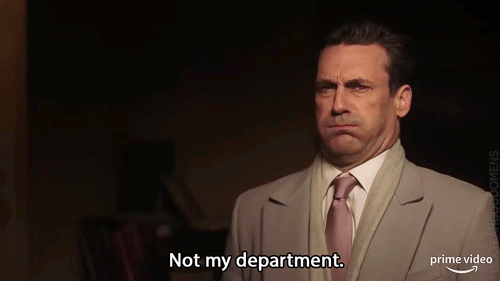
The trial was probably the first time Gabriel ever got to say "no" to anybody, and ironically he was exercising his celestial authority, even though he was accused of not doing so. Up until then, he'd always been more of a yes-man.
GABRIEL: I told you you could ask. However, I am the only First-Order archangel in the room, or, you know, the Universe, so I'm not gonna answer so much. But you feel free to knock yourself out with all the asking. Anyway, Armageddon the Sequel, that's a nah.
And there is Gabriel also saying no to answering questions!
One thing I've often wondered - can Gabriel's trial offer us a look back at what happened to Crowley before his Fall?
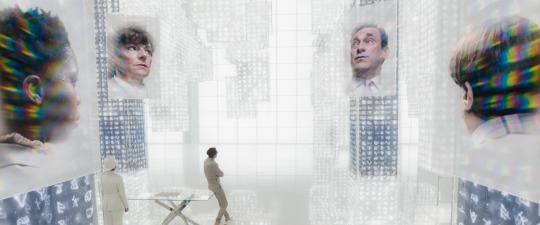
Something, some link between Gabriel and Crowley, is implied when Gabriel states he is the only First-Order Archangel in the room. I'm not just talking about the prince of Heaven comment, but Crowley could have been put through a similar trial before his Fall and shown similar defiance? Who would dare say no to the Metatron?
Crowley has nearly always been ready to say no when necessary, since the very beginning. He said no to killing children, he said no to taking up a Duke of Hell position (so far 😉) and he said no to Armageddon, amongst other things.
The scene down in Hell with the two thrones in S2E1, where Beelzebub offers Crowley "anything [his] nasty little heart desires" has a lot of parallels with the Metatron's offer to Aziraphale and is jam-packed full of other good stuff, but I'm just going to pick out a couple of aspects here, because I promised some Beelzebub-Aziraphale parallels.
One is the implication that Crowley was an equal to Beelzebub when they were both angels when Crowley responds to the threat about the Book of Life.

The two of them sitting together, side by side, reinforces this impression of them being equals of some kind. And just as Beelzebub is an Aziraphale parallel, so Aziraphale is Crowley's equal as well - in the present day. (They're a team, a group of the two of them, an Us.)
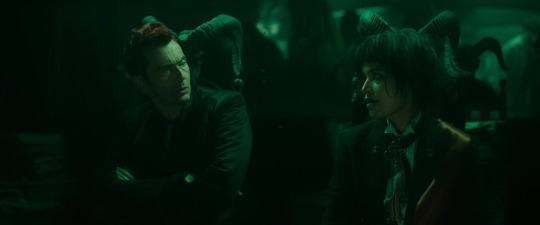
But what about when Beelzebub gets up to face Crowley, and leaves the other throne vacant? Hmm.

So we know the second throne was supposed to be for Gabriel, who never arrived. During the course of the series it gets pushed to one side, then disappears altogether, and Beelzebub appears on a cushioned white and gold chair reminiscent of Aziraphale's chair by his desk (see below.)
Ah, on second thoughts, I'm going to leave the rest of what I was going to say here for another meta (sorry!) because it pertains more to speculation about Crowley and Aziraphale in S3. Let's move on...
BEELZEBUB: Do you ever think, wouldn't it just be nice if someone told you what a good job you're doing?
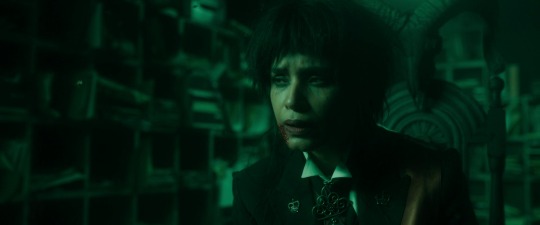
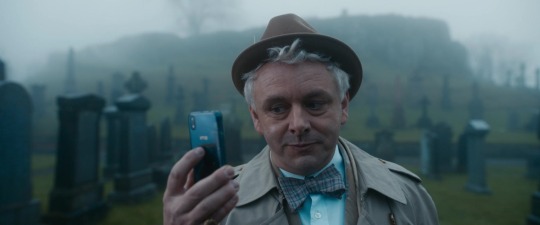
@vidavalor already covered most of this parallel here, but while Aziraphale has Crowley to fall back on, and Crowley is happy to oblige with a few words of - lets not call it a "praise kink," isn't the love language term Words of Affirmation? - now Aziraphale is not reporting to Heaven, Beelzebub hasn't. Well, Demon Josh really isn't the appropriate person to be delivering that, anyway! And part of the problem lies with the next item to be discussed. I'm wondering if Gabriel is going to need to a bit of work in that department.
We need to have a talk about the following exchange between Beelzebub and Shax towards the end of S2E4:
BEELZEBUB: Can you enter the bookshop, without permission? SHAX: Not technically, no. But give me a legion of Hell's finest troops and see what I can do. It's a chance I've been waiting for, Lord Beelzebub. To be clear, you are hereby authorizing me to storm the angel's bookshop, sending wave after wave of demons to besiege it until it falls and capture the Archangel, destroying anything and everything that stands in our way? BEELZEBUB: No. I am not authorizing you to do that. SHAX: Oh. BEELZEBUB: I am commanding you to do it. I want you there, Shax. On the ground. Bravely leading the attack into the bookshop, leading the army of the damned.
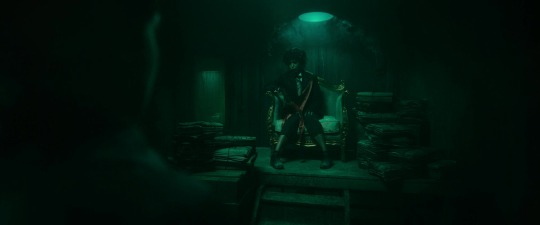
I've already mentioned that there is a bit of emphasis on the word "authorize" and "authority" in places in S2, and this is one of them. But here it has a particular context. You need to ask what the difference is between commanding someone and authorizing someone, and it turns out there is a significant difference in meaning. (No, it doesn't mean pulling out a hand-written permit from your back pocket ...)
An authorization is mere official permission for something, but a command is a directive that implies there is a hierarchy in place, and the one giving the command is the one in authority who expects compliance. This was Beelzebub reminding Shax where her place was.
Later, Aziraphale takes command of the bookshop...well, somebody has to. Or, if you don't agree its here, perhaps it will be in S3. He's definitely not at the top of either hierarchy here but this is his domain.

I think I will wrap up this meta with one last example - the two parallels reaching out for their significant others.


There are probably a few more examples that could be discussed, if enough come up in discussion I'll do another post. Otherwise, I hope you enjoyed this look from a different angel - er, angle.
"Enemies, as well as lovers, come to resemble each other over a period of time." - Sydney J. Harris
*There have a been comments lately on other posts linking Nanny Ashtoresh's name with the ancient goddess Astarte, a goddess of both Love and War, amongst other things.
This meta is part of a series on Gabriel
Gabriel as a Shoulder Angel: S1 Study
S2 Study Part 1: Ep.1 The Arrival and Ep. 2 The Clue
S2 Study Part 2: Ep.3 I Know Where I'm Going and Ep. 5 The Ball
S2 Study Part 3: Ep.6 Every Day
First-Order Archangels Part 1: Maybe You'll See An Archangel
First-Order Archangels Part 3: Seeing Eye to Eye
#good omens#good omens 2#good omens meta#good omens analysis#crowley#gabriel#aziraphale#beelzebub#shax#michael#the metatron#red horse or war#so glad to finish this one#been nearly six weeks to get it all out
69 notes
·
View notes
Text
It hurts me that I cannot put it into words effectively enough but just to put it out there- I think Aziraphale and Crowley's whole relationship parallels that of a student and teacher.
We always see Crowley trying to explain things to Aziraphale from his perspective, questions and urging Aziraphale to reach the conclusion on his own. (Which is that Heaven is no better than Hell and that both the places are toxic.)
He has already reached that conclusion long ago and knows that deep somewhere Az thinks so too but is just ignoring the truth. That's what drives the whole banter. He is asking Aziraphale to stop thinking in black and white and that is why when in 1941 he finally accepts the shades of grey, the whole sequence becomes so important !!
And why it is also perfectly ruined in the final fifteen when Crowley says we don't need Heaven, we don't need Hell, they're toxic, he is repeating what he has been saying for six thousand years !! And when Aziraphale says ofcourse you said no to Hell, you're the bad guys, he is going back and throwing away everything he has learnt in that time and returning to black and white.
The heartbreak would not have been bad enought if he would've just left Crowley, it was way worse because he just went back on six thousand years worth of teaching and perspective and lessons after lessons (Noah's ark, Job, etc etc.).
Which just sounds nonsensical, right ? Because how can you first hand experience all that Heaven did over the years and still vouch for them. Call it the side of light. How can you call your best friend you trust more that God herself 'one of the bad guys' unless you are actively trying to sabotage your relationship ?
#aziraphale#good omens#good omens 2#crowly x aziraphale#crowley#ineffable husbands#aziracrow#neil gaiman
20 notes
·
View notes
Text
Ineffable Lapels: Our Side
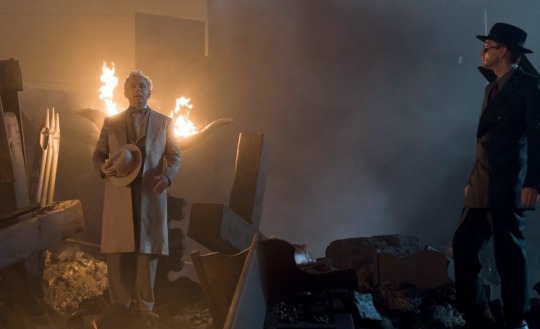
I've seen some stellar breakdowns and analyses of the costuming for Good Omens, and I'm personally blown away by the consideration afforded to each element of the visual production of this show. I even appreciate the anachronistic elements that Claire Anderson chose to use in the 537 A.D. Kingdom of Wessex flashback, because aesthetic was more important than historical accuracy (Oscar Wilde would support me here, I am certain.) And to be perfectly honest, 6th century European armor was not going to cut it. So much quilting.
This discussion is just a little traffic circle spin that I wanted to address with no larger point than to say how much I adore Anderson's work on this show. That's a lie. This post has actually gotten out of hand, so grab yourself six shots of espresso in a big cup and get in. We're going for a ride.
It's the smallest detail, but have you noticed the Ineffable Idiots' lapels? Crowley's lapels always point up (not the case with any other demons). Aziraphale's lapels always point down* (again, not the case with other angels). *I'll address the one divergence at the end of this post. It's kind of the whole point. It'll be worth it. Just drink your espresso and listen.
Lapels are a fantastically subtle way to express characterization when costuming an angel and a demon. Perhaps Aziraphale's lapels are an echo of his wings? Maybe Crowley's lapels symbolize devil horns? Maybe their costumes are just reaching out trying to give each other a hug. I dunno.
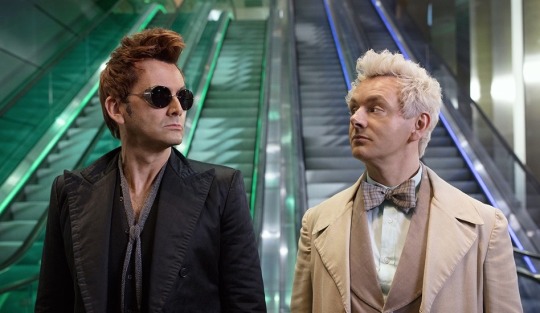
I'm going to start with promo shots from both seasons that show Crowley and Aziraphale's present day wardrobes. The first promo shot pictures the costumes for all of present day S1. It's perfect for demonstrating the most pronounced expression of the lapels. Consider this a baseline or something like that.
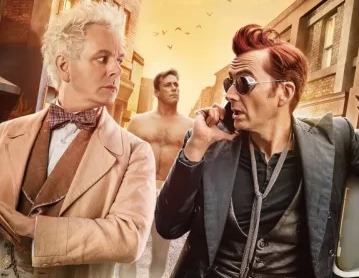
The close up of the promo for S2 (featuring nakey Gabriel and the migrating nightingales...I'm not crying, you're crying) shows pretty similar costumes to the first season. Yes, the hairstyles have subtly changed (Crowley's not so subtly, perhaps), but the lapel positioning for both characters remains consistent.
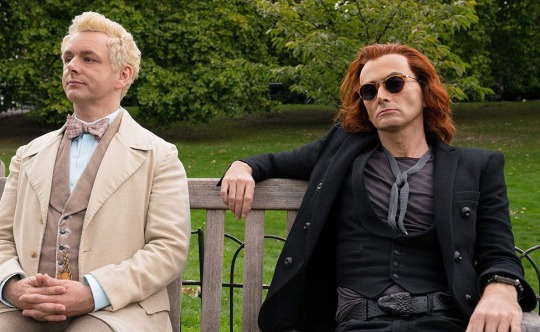
Going back in time. (Let's call this the Baby Antichrist Era, shall we?) Crowley's collar is quite a bit narrower than in the present day, but the lapels still point up. Obviously, Aziraphale is still wearing the same coat. Obviously.
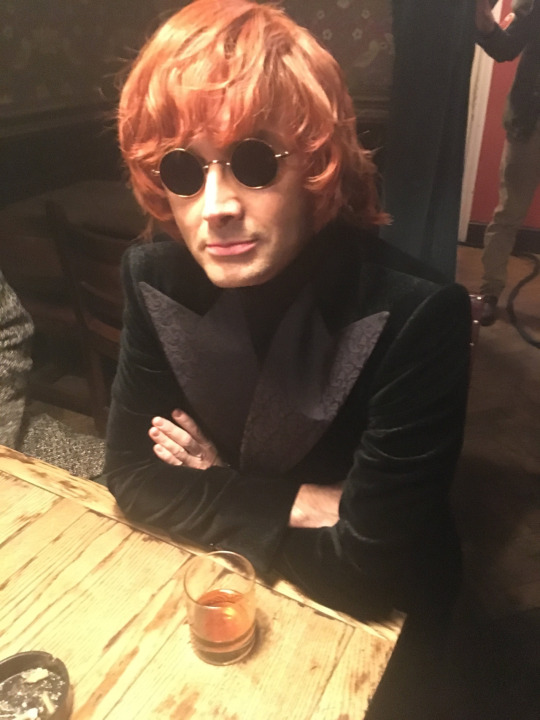
I will never recover from this John Lennon bastardry. But still, check out those lapels. And the brocade is so 60's and so over the top.
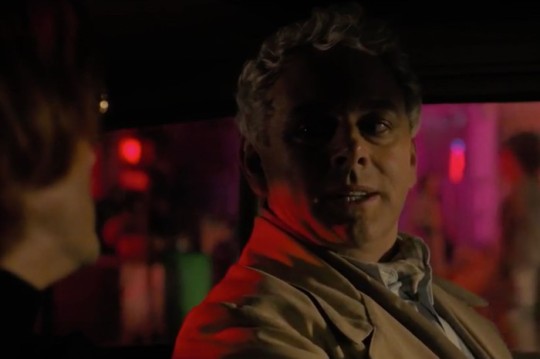
And here's Michael delivering his favorite line from S1, whilst breaking Crowley's (and literally everyone else's) heart. Do take a gander at those downward-facing lapels, though, and 'scuse me while I go have a quick cry.
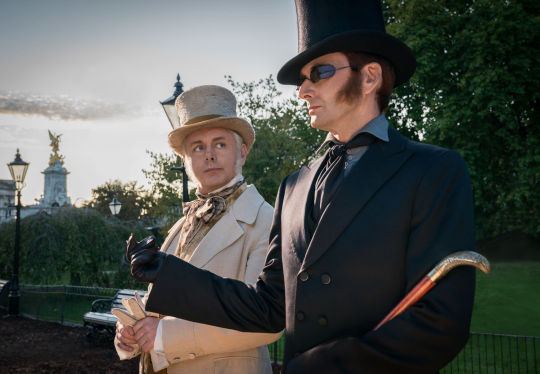
I'm going out of order with this next image, back to the start of the Holy Water incident. (Don't worry, we will get to 1941. It requires more attention and will have to wait its turn.) Not a whole lot I want to pull from this image other than Aziraphale's fuzzy top hat and Crowley's snake-handled cane, which I believe he's using as he recovers from his recent trip to Hell. These costume pieces have nothing to do with lapels, I just think they're neat. But the lapel pattern holds: up for the demon, down for the angel.
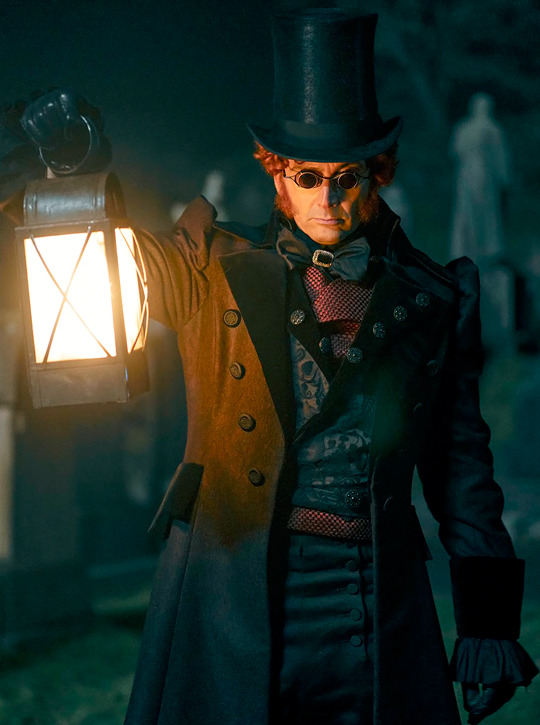
A few decades earlier, we see Crowley in Edinburgh just hours before being sucked into an infernal whirlpool. The lapels here are more parallel than distinctly upward-pointing, but the extravagant shoulders on this overcoat demand a balancing lapel line.
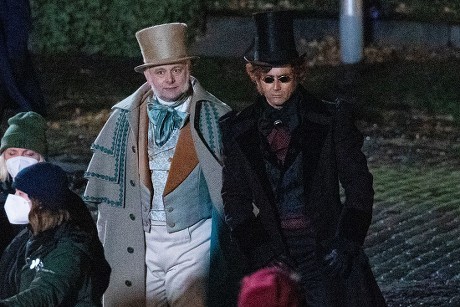
Likewise, on Aziraphale's overcoat we don't see a defined downward-pointing lapel, so much as a wide horizontal collar, but the layers of wing-like capelets create an impression of flowing down. With these two stunning overcoats from the Edinburgh flashback set, I think the unusual period elements take the place of the lapels in demonstrating the upward tilt in Crowley's ensembles, and the downward pull in Aziraphale's.
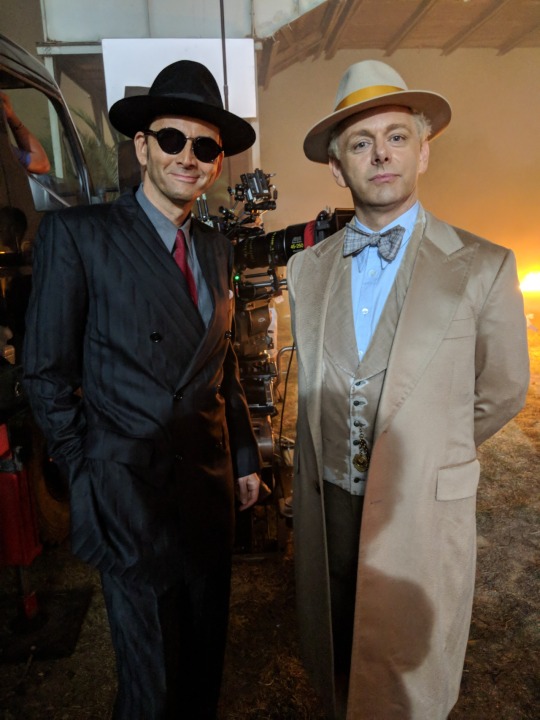
Okay, now we can discuss 1941. Because this is where the cookie crumbles. Originally, these costumes vexed me. As usual, Crowley wears his upward-pointing lapels. But Azirapalala, goddamnit, also has upward-pointing lapels to match Crowley. But am I gonna' let a little thing like this destroy my thesis? Don't shit with me when I am analyzing costumes, because this is also the night when Aziraphale realizes he's in love with Crowley (this is Sheen cannon and cannot be disputed).
Their lapels match because of Aziraphale's revelation--he finally understands what it means to be on "Our Side," because he's finally admitted to himself that he is head-over-bloody-heels in love with the wily demon. The matching lapels in 1941 is some St. John of Patmos-level stuff, I think, their matching collars revealing their synchronicity. Even if it's only for the one night, they're one the same page, heading in the same direction. I know many of us in the fandom are pretty preoccupied with the idea of a third 1941 flashback in S3 because this night seems to be the hinge in their relationship. It's the night when everything changes. It's not just Crowley swooping in to rescue his angel, as he's done in the past. They're mutually dependent on one another to make it through the night alive, well, at least to avoid discorporation (it's romantic, okay?) Crowley diverts the Luftwaffe plane; Aziraphale protects them from the blast of the bomb; Crowley saves the books; Aziraphale saves Crowley's ass from an irate Mrs. Henderson; Crowley saves Aziraphale's magic show (by literally not discorporating him on stage); and Aziraphale saves both their asses with some surprisingly successful prestidigitation when he swaps out the incriminating photo Furfur had managed to snap of the Ineffable Morons.
Crowley and Aziraphale's matching lapels in 1941 isn't a fluke or a costuming blunder. I think it's a very subtle head nod to what we all know actually happened that night: Aziraphale took a tenuous step forward in their relationship. A step 6000 years in the making. A step that, if noticed by their respective superiors, could mean the actual and eternal end to them. He couldn't shout it from the rooftops--he couldn't even speak of it directly in private (I mean he tried, but "That's what friends are for" was as painful for the viewer as it was for Crowley and Aziraphale.) He couldn't disclose through words or direct actions what he needed the demon to know, so he used what avenue he had available to him. Through the subdued symbolism of his bloody lapels, Aziraphale communicated to his demon, "I am on Our Side."
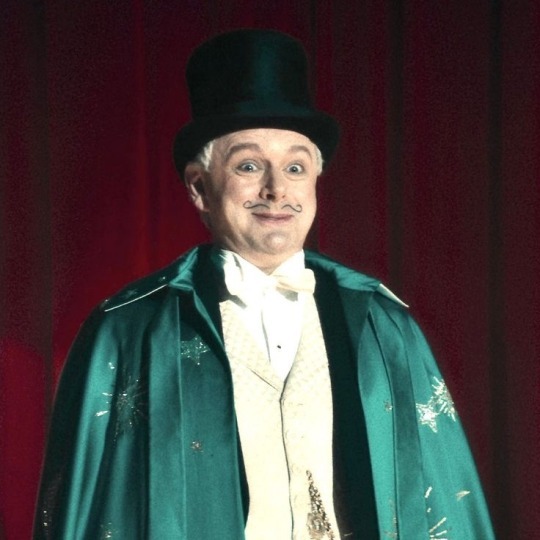
For reading to the end of this post, you get a very special reward! Here is The Amazing Mr. Fell. I love him. I'm not going to address right now the fantastic costume because this beauty deserves a post of its own--the cape with the stars! THE CAPE WITH THE STARS! HE'S SWATHED HIMSELF IN CROWLEY'S CREATION...I'm fine.
#good omens#aziracrow#aziraphale#crowley#costumes#ineffable husbands#ineffable idiots#amazing mr. fell#I just wrote a whole post about lapels#aziraphale is in love#crowley is in love#can i get a wahoo
66 notes
·
View notes
Text
Good omens 2 SPOILERS BELOW!
Let's start off by saying that I never, EVER expected that we would get canon Ineffable Bureaucracy, but here we are, and I'm so happy about it. 🥹
Most importantly, I'd never expected Gabriel and Beelzebub to be a mirror of Aziraphale and Crowley's relationship.
In season 1, Gabriel was the absolute fucking worst.
Self-centered, lacking emphaty, superb, following Heaven's rules to the letter, without a single question, and putting his job as an Archangel (or well, the Supreme Archangel, as we've learned this season) above all else, not really thinking much about Earth, humanity or the opposition's point of view/emotions.
Not only that, but he stubbornly refused to enjoy the life Earth- or anything/anyplace else but Heaven, really- could offer him, in the material (food, music, material objects, ecc...) and emotional sense of the term too, depriving himself of real friendship and love.
Then, he meets Beelzebub in the pub and, for the first time, he feels understood. After 6000 years of bearing the sense of loneliness authority and responsibility imply, and being stuck in his own, bigoted head, he finally finds someone who gets him.
On the other hand, Aziraphale has always been a... peculiar angel, to say the least. He has learned to perfectly blend in with the humans, enjoy their creations and Earth's delicacies, such as food, good music, books, magic tricks, etc... not only that, he "associated" with Crowley, a demon/sworn enemy, since the very beginning!
In season 1, Aziraphale defied God's plan, prevented the Armageddon and disobeyed the Archangels' orders just to keep living on Earth and keep seeing Crowley. Albeit he refuses to acknowledge it, he is a rebel, way more than Gabriel's ever been in 6000 years.
And yet, which one of the two decided not to take Heaven's crap anymore?
Who said "You're casting me down to Hell? Fine, I accept my fate" peacefully, almost happily, knowing they'd finally be with their loved one?
Who ran off to Alpha Centauri?
Who gave up everything they've worked for, everything they've ever known, everything they've believed in?
Gabriel.
And Beelzebub, of course.
To say I did NOT see this coming at all is an understatement.
Gabriel, the one filled with so much prejudice, ignorance and selfishness- his royal smugness, Crowley's words- chose Beelzebub and their happiness over everything, over God, only truly knowing them for like... what, 4-5 years (which is the timeskip between season 1 and 2)?
Aziraphale, as heartwrenching as it was to see, chose Heaven over Crowley (FOR NOW). After a 6000 years-old friendship/relationship!
Perhaps, having been so "distant" from Heaven itself, Aziraphale still sees it as something that can be "fixed" if led by the right person/angel (while Gabriel, being so involved in Heaven's management for millennia, probably knows better in that regard, and basically said "fuck it"- I mean, we've seen Metatron and God's behaviour, eesh), plus he's plagued by the guilt and fear of being a bad angel, and risk to Fall.
I believe Aziraphale still sees being a demon as a bad thing, he has this internalized idea he has yet to let go of. And I hope season 3 (hopefully, we'll get it!) will cover that.
Long story short, I loved this season, and I loved how they incorporated Gabriel and Beelzebub in the story.
Some might say their romance was "too quick", and while I would've loved to see more flashbacks, I think it fits.
The Ineffable Husbands are a slow, slow slowburn, and Aziraphale truly needs a wake-up call, to see Heaven for what it truly is: toxic and rotten, as Crowley said.
On the other hand, I liked that Ineffable Bureaucracy happened so "fast"- it's a nice parallel. Gabriel and Beelzebub- people who could be so fierce, cold, nasty and closed-minded in the past- immediately saw the love they had for each other, accepted it and let it change them completely.
Let them both become so affectionate with each other, too. Like, "my sweet", "wherever Beelzebub is, is my Heaven", "where Gabriel is, is forever my Hell", "I was coming to you", "silly angel", are NOT something I thought I'd hear 'em say 😂
Nor I thought "Everyday" would be their song.
#good omens#good omens season 2#good omens spoilers#good omens season 2 spoilers#spoilers#ineffable husbands#ineffable bureaucracy#aziraphale#crowley#beelzebub#archangel gabriel#go spoilers
97 notes
·
View notes
Text
Fix the System vs Ditch the System
I just want to applaud Neil Gaiman here for how perfectly these two scenes parallel each other because I had noticed it before, just not how well. 👏 We were all shocked by the season 2 finale but really we should have seen it coming because that scene had already played out before in Episode 1.
"I think my your exactly and my exactly are different exactlys..."
Upon discovering that Gabriel has forgotten everything and has turned up at the bookshop, Crowley and Aziraphale have a shared goal: to resolve the Amnesiac Archangel Problem. Aziraphale wants to fix the issue, he wants to help. Crowley, on the other hand, wants to ditch it. Quite literally. He wants to take Gabriel to Dartmoor and leave him there, getting him and Aziraphale far away from the problem.
The thing is, while they both have a common goal, they both assume that the other will agree with their methods, despite having two completely different ideas about what to do.
Sounds very familiar, right?
"We can make a difference."
When you look at the season finale, it plays out in a very similar way. Crowley and Aziraphale have a common goal: protect each other. However, they both have different solutions but have assumed that the other has the same idea.
Much like in Episode 1, Aziraphale wants to fix the problem. He knows that Heaven is corrupt and he believes that he can restore the system to what it is supposed to be. But Crowley wants to get as far away from Heaven and Hell as possible.
And it isn't just the situation itself that parallels. The same character flaws are responsible for both issues.
"A group of the two of us."
Crowley and Aziraphale have existed alongside each other for a long time and understand each other more than most. However, their closeness has led to a lot of misunderstandings as they assume that the other will think the same way as them when it comes to certain situations and their expectations of one another can be entirely unfair.
While it makes sense for Aziraphale to want to fix both situations, it isn't right for him to assume that Crowley will be okay with facing his trauma like that. He knows what Crowley went through as a result of Heaven's behaviour and he can't expected him to want to face his past like that. Assuming that Crowley would want to help someone who has caused him huge amounts of grief is unfair in the same way that expecting Crowley to go back to a place that punished him for doing no wrong is.
Likewise, it is very reasonable for Crowley to want to ditch the system and yet he can't expect Aziraphale to make the same decisions when Crowley himself hasn't provided him with the same context that he has. Crowley was there when Gabriel told "Aziraphale" to shut his stupid mouth and die. Aziraphale wasn't. And Crowley never told him. Similarly, Crowley knows exactly how and why Gabriel lost his memory but he never explained it to Aziraphale. He has context that the other doesn't so he can't expect the same decisions to be made.
It's the same mistakes made over and over again.
So the new question is...
Will there be a change?
I think it is safe to assume that the answer is yes because otherwise there wouldn't be any character development and that would be weird. So I guess we need to assess the current situation. And the best way to do that? Look at the parallel scene in Episode 1!
In both situations Crowley walks out. They both realise that they aren't on the same page and rather than talking it through they go their separate ways. Crowley only comes back when he discovers that Aziraphale is in more danger but while he apologises, he never explains his reasoning, so Aziraphale just assumes that Crowley realised he was wrong and came back.
And because of that, nothing changes. Nothing was ever talked through, none of their reasoning explained. This is why the same thing happened again later in the season.
Looking at the current situation, this is where I think we are finally going to see a difference. I think that Crowley is going to go back when he realises that Aziraphale is in more danger than initially thought, but rather than going through a repeat of what happened before, I think there will be a change. Not necessarily straight away, but I think that this will be the time when they finally talk things out. It'll be the last time that this repeat problem happens and the first time when they realise that they need to stop assuming that they both want to go about things the same way.
Aziraphale wants to fix the system. Crowley wants to ditch it.
And the resolution will come when they both finally understand why.
#why do I always get the urge to write these when I have somewhere to be#but here we go!#my first analysis post in a while#but still about good omens#because the ineffable husbands have not yet left my brain#good omens#good omens 2#crowley#aziraphale#ineffable husbands#ineffable divorce#aziracrow
44 notes
·
View notes